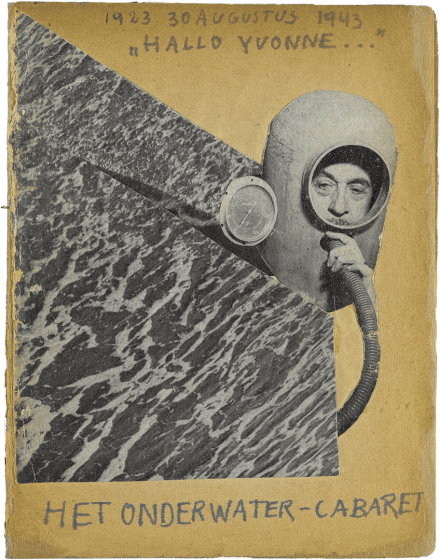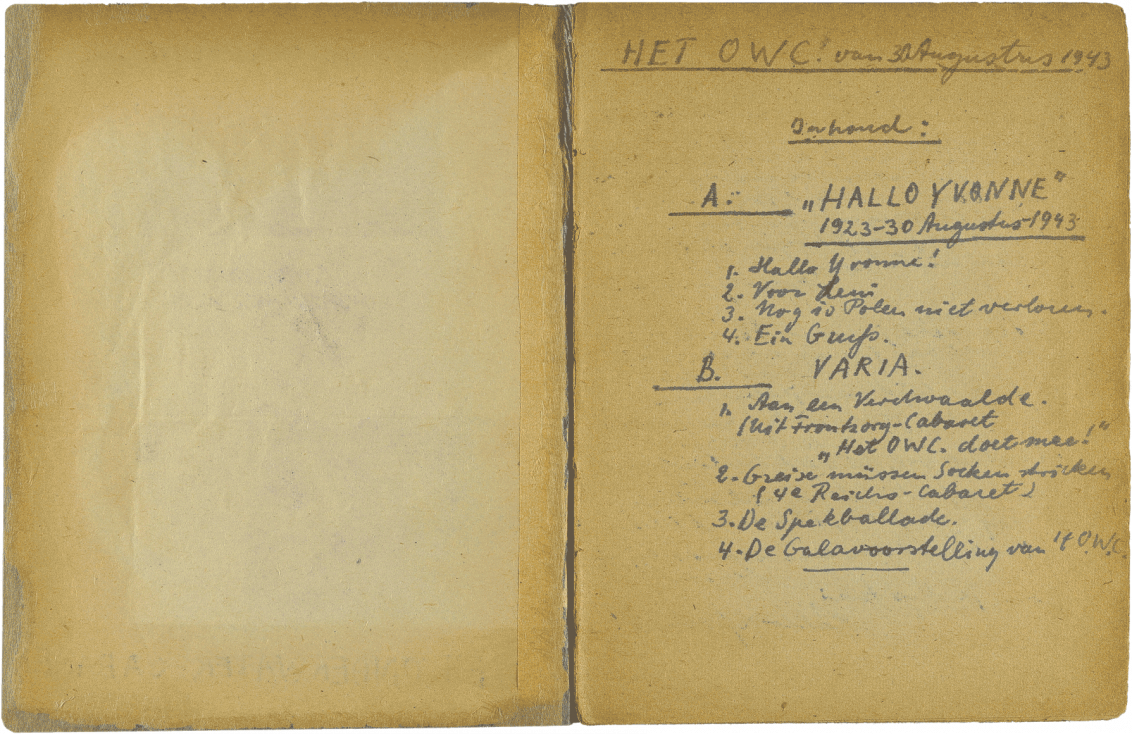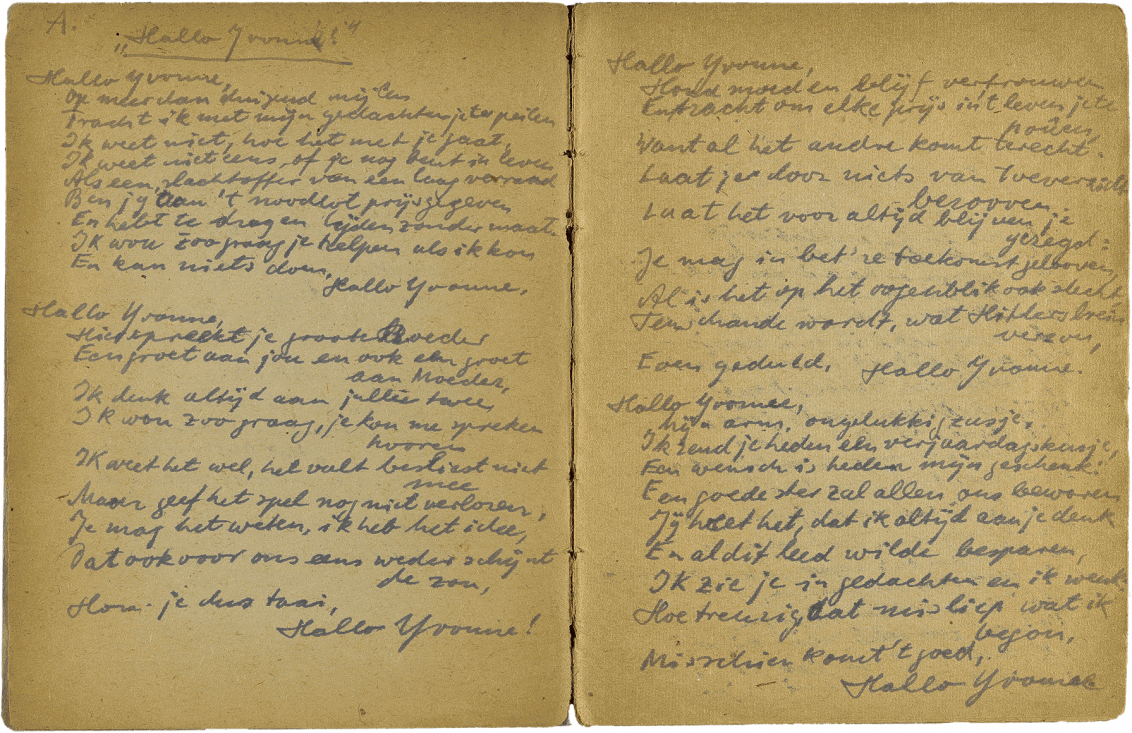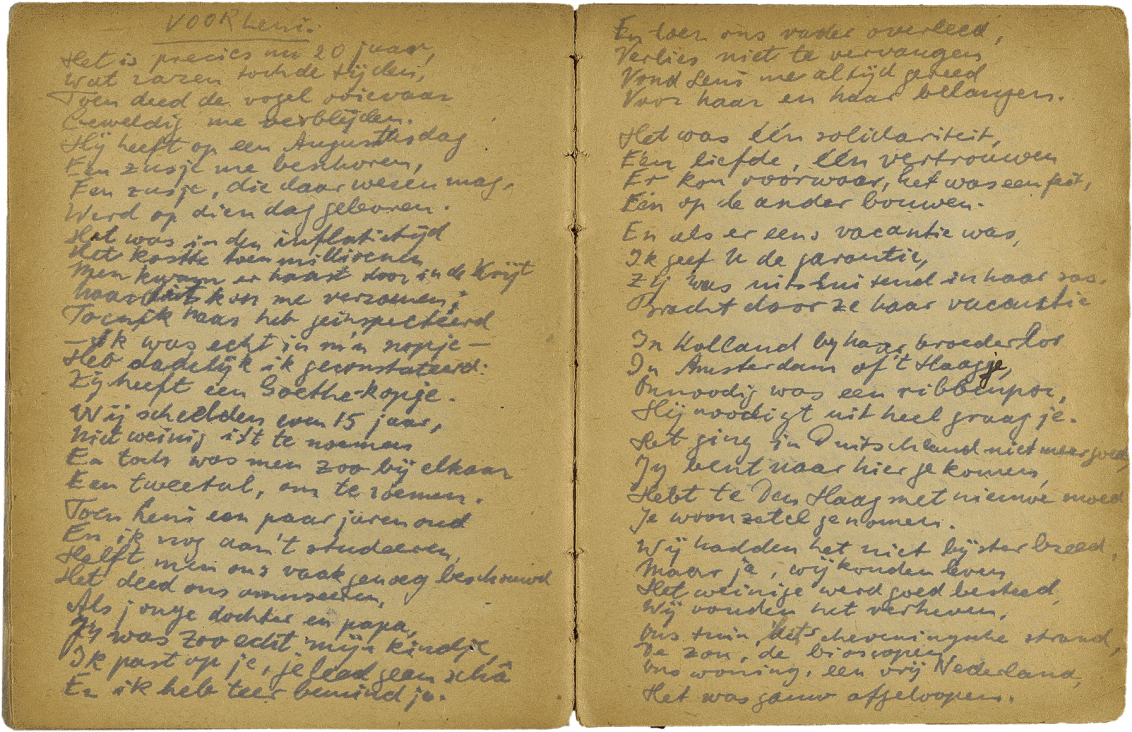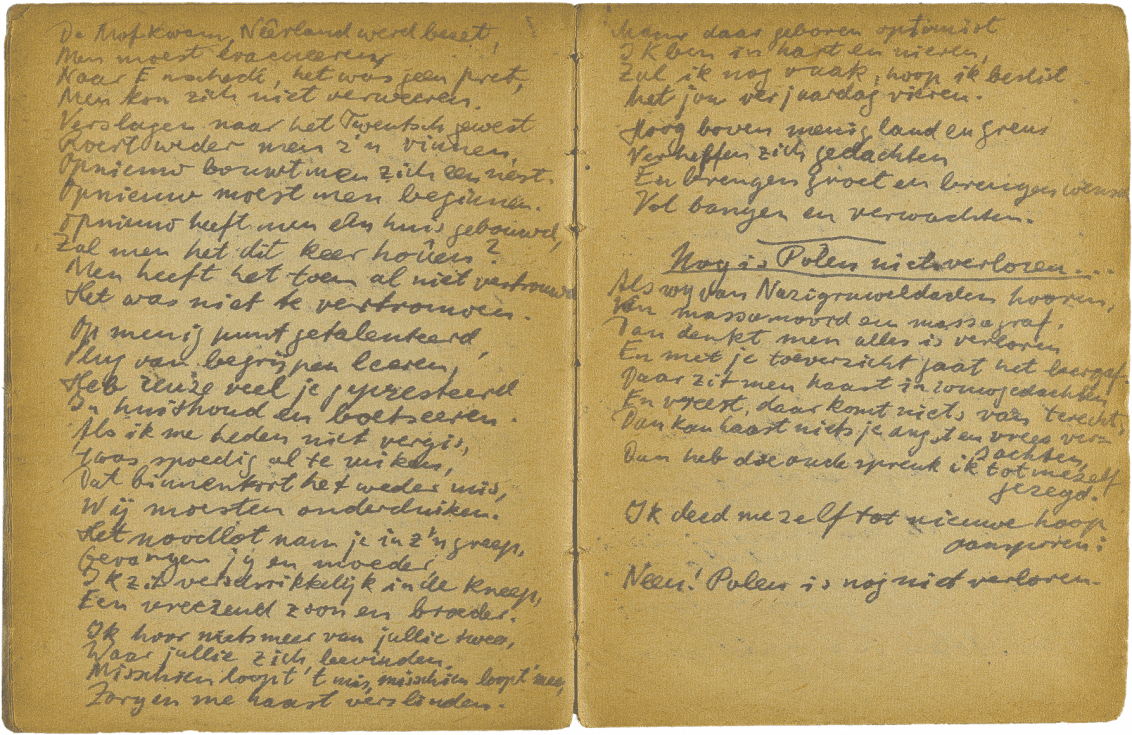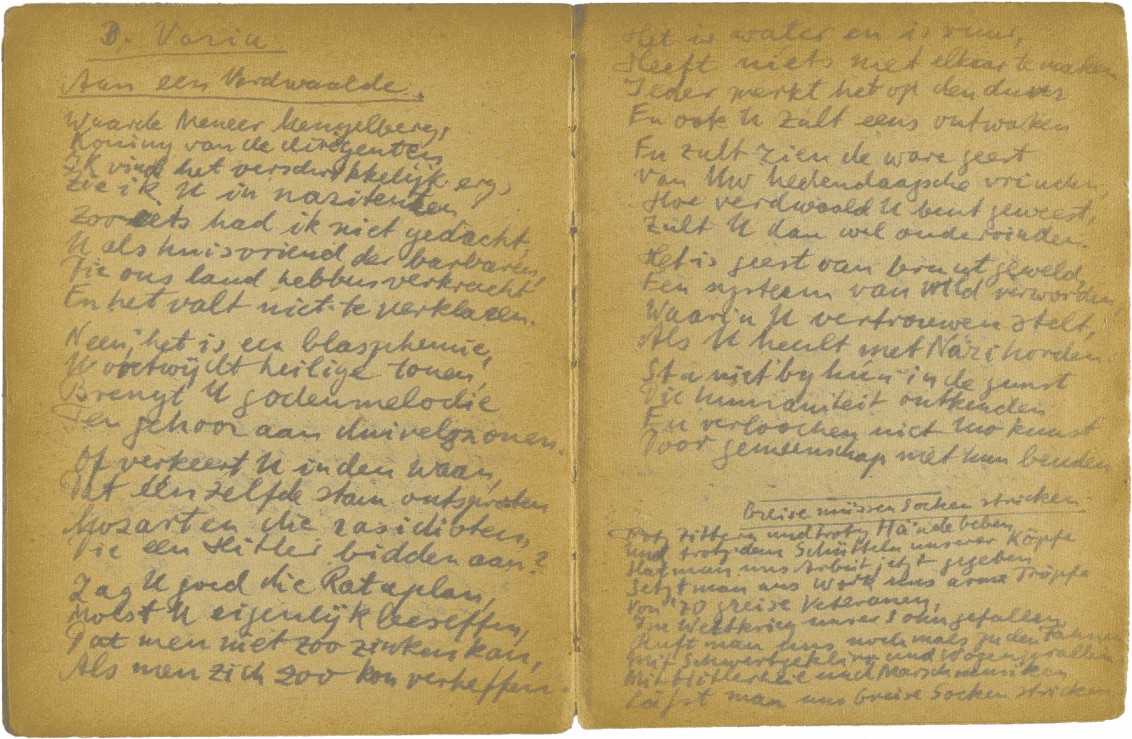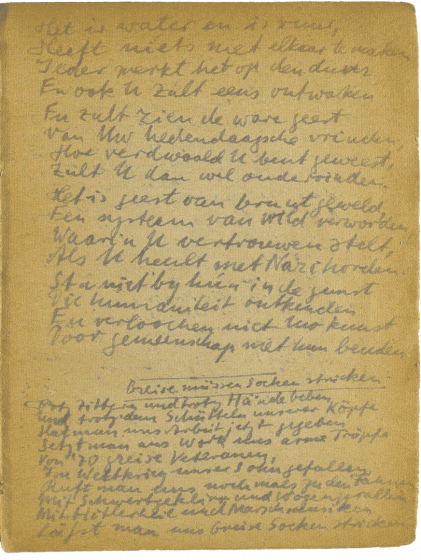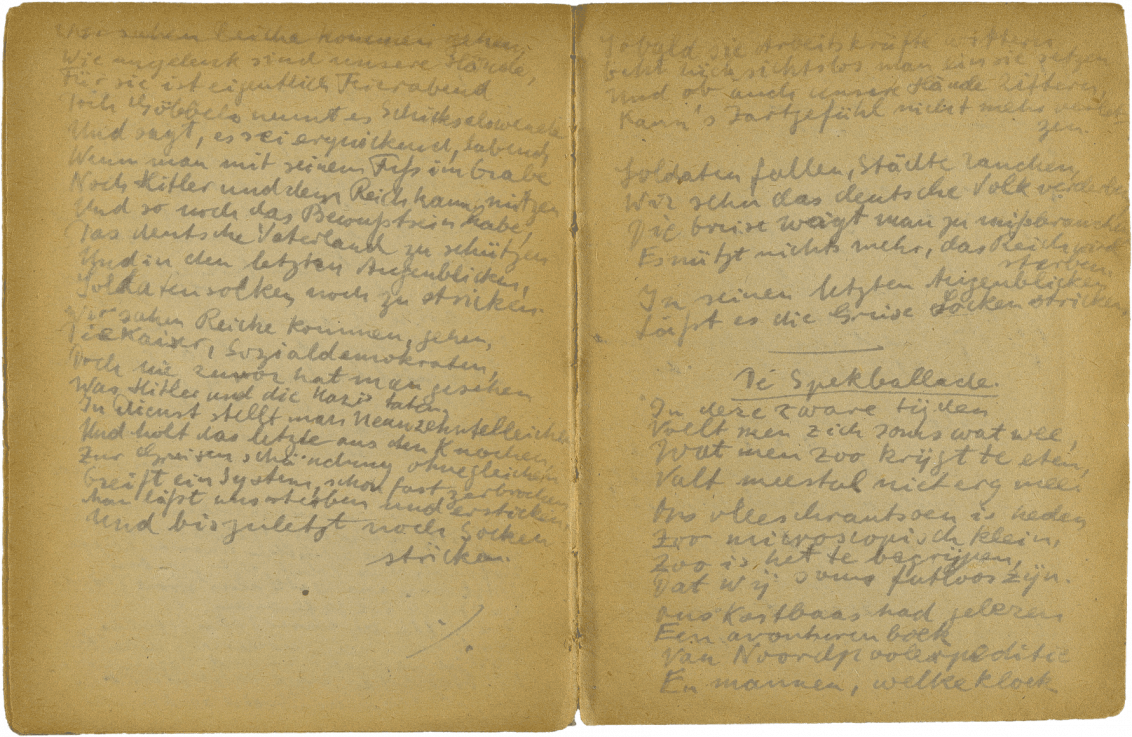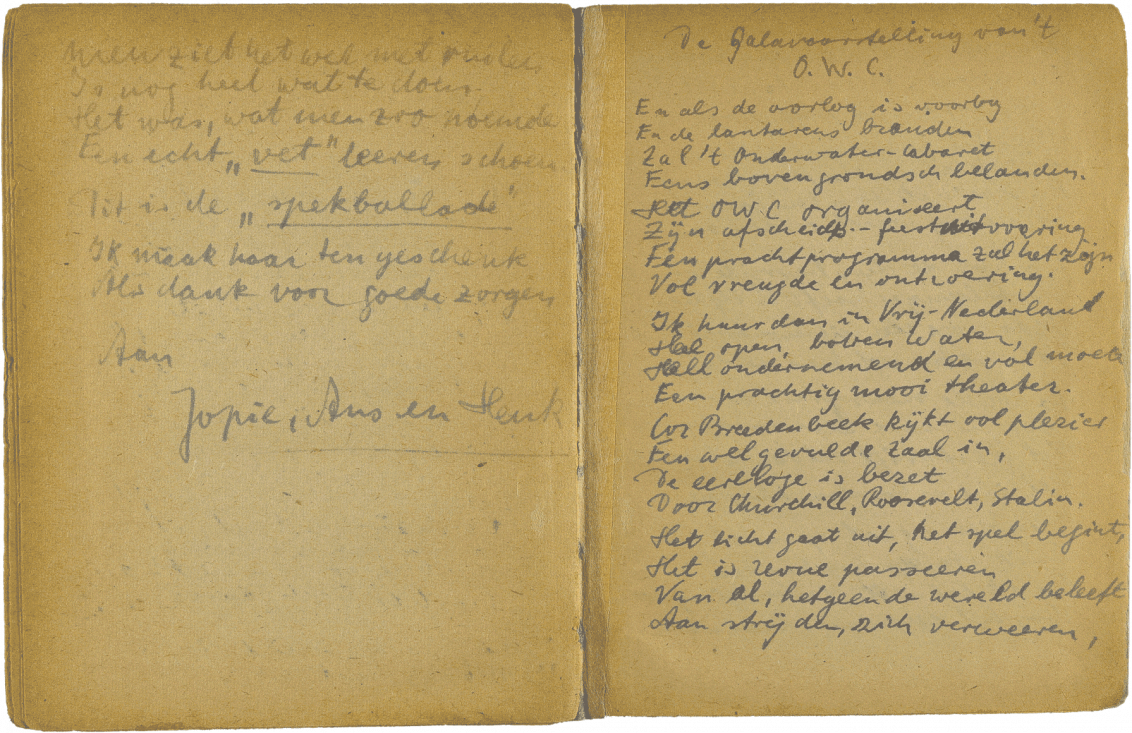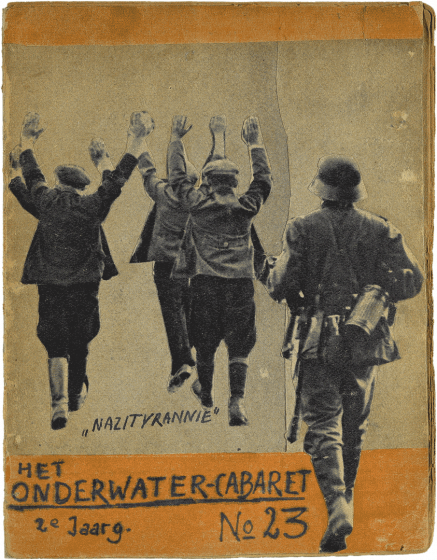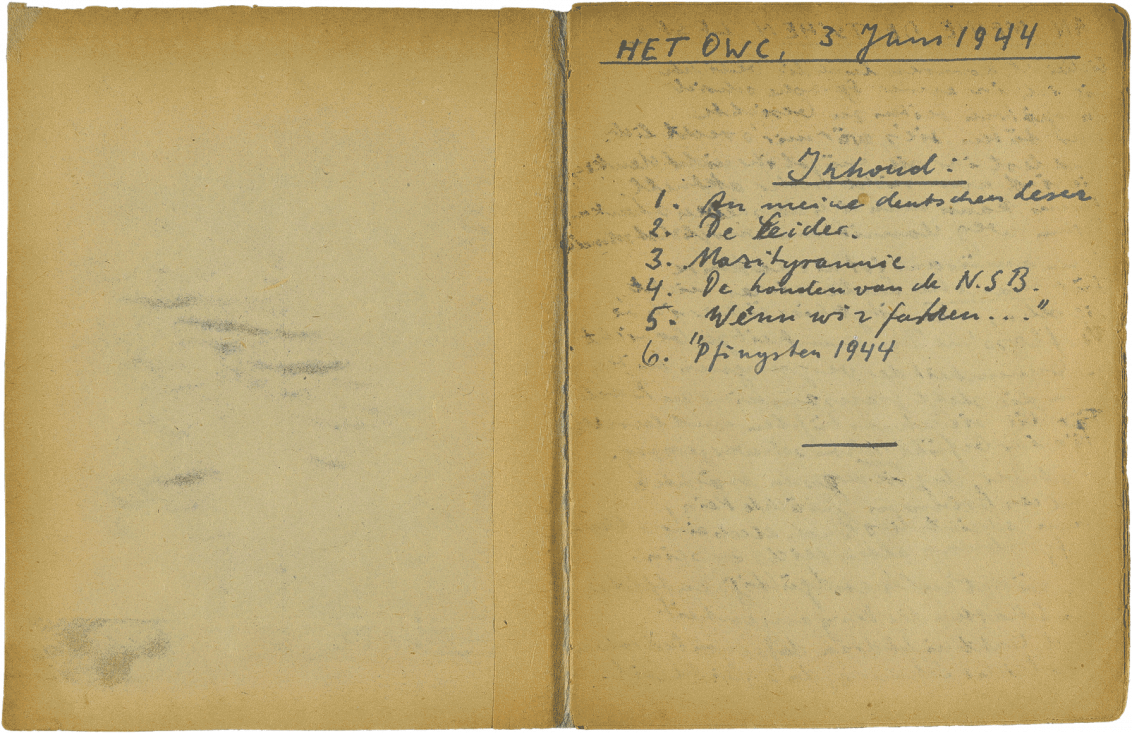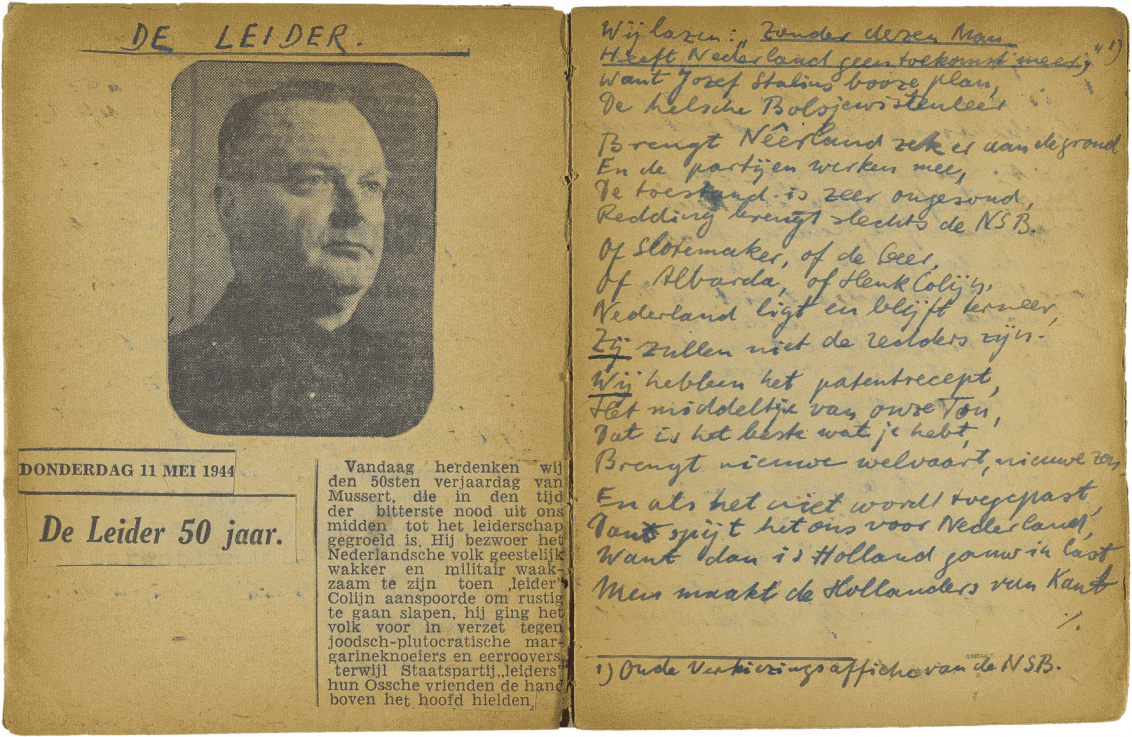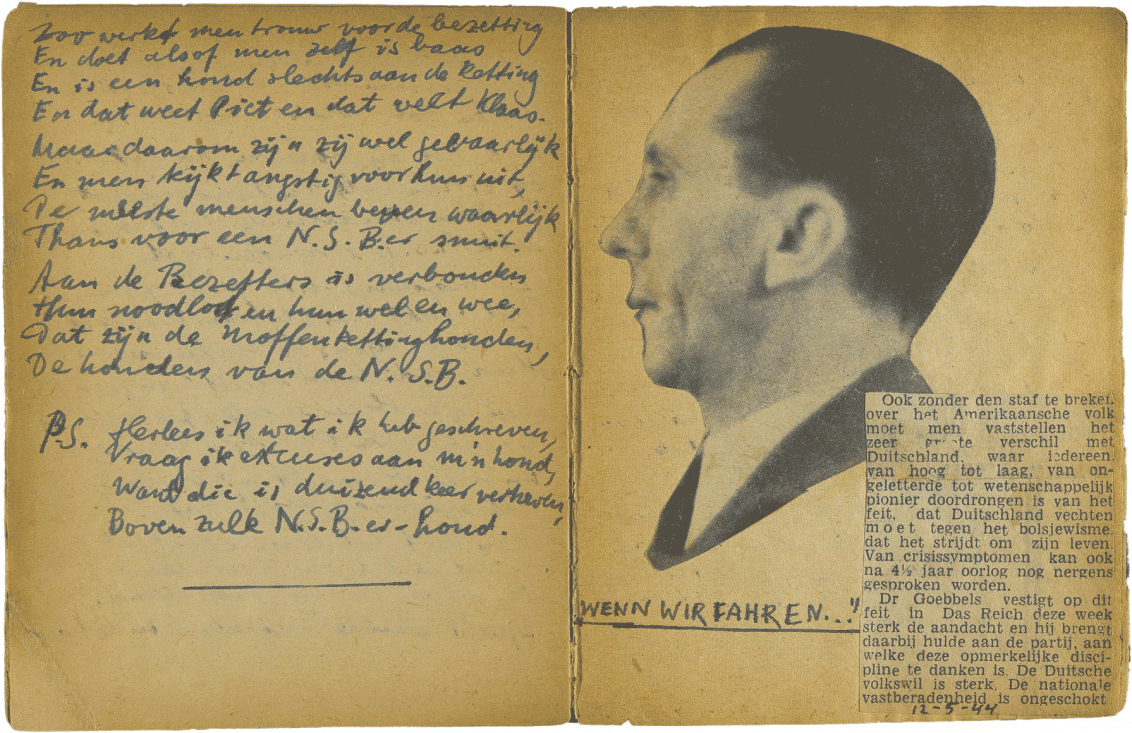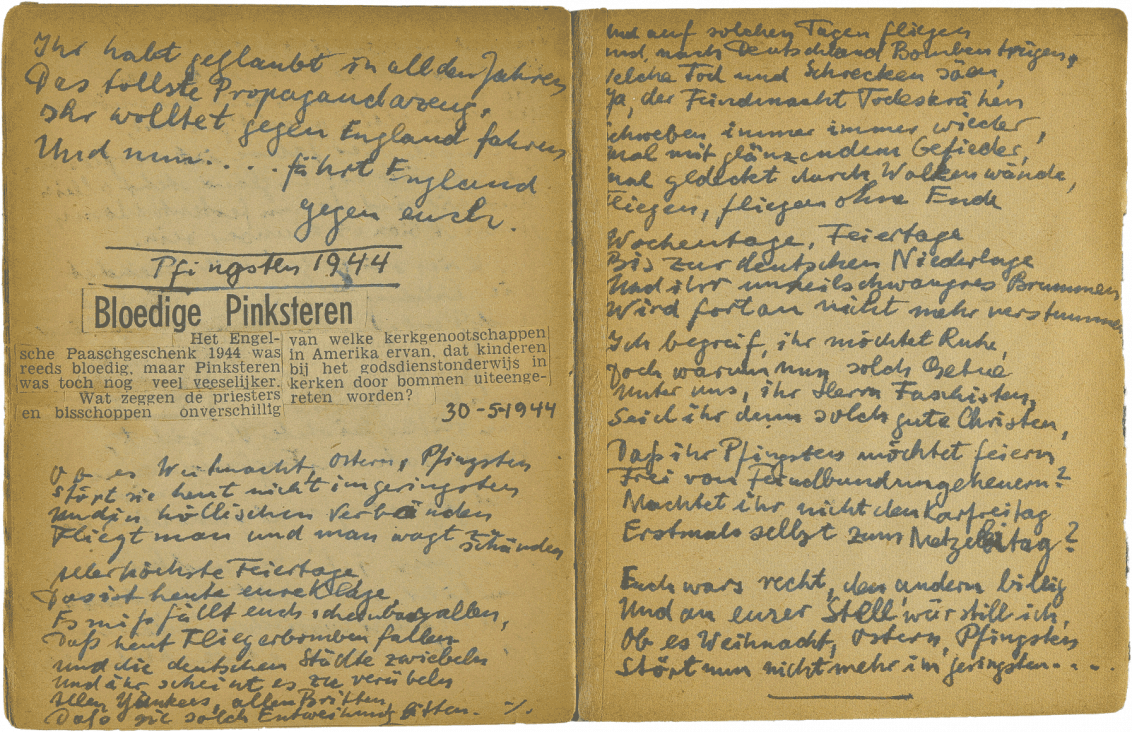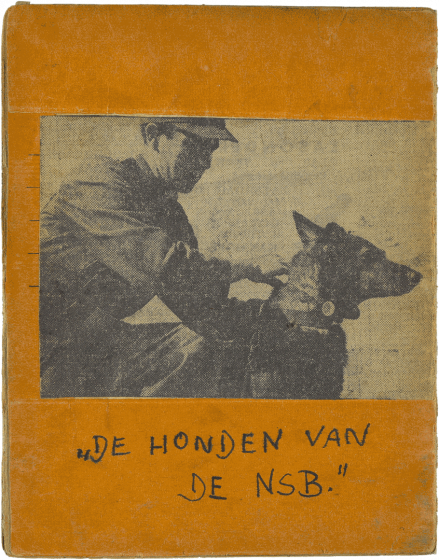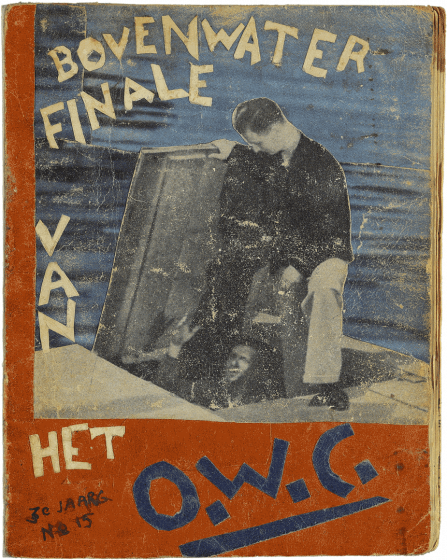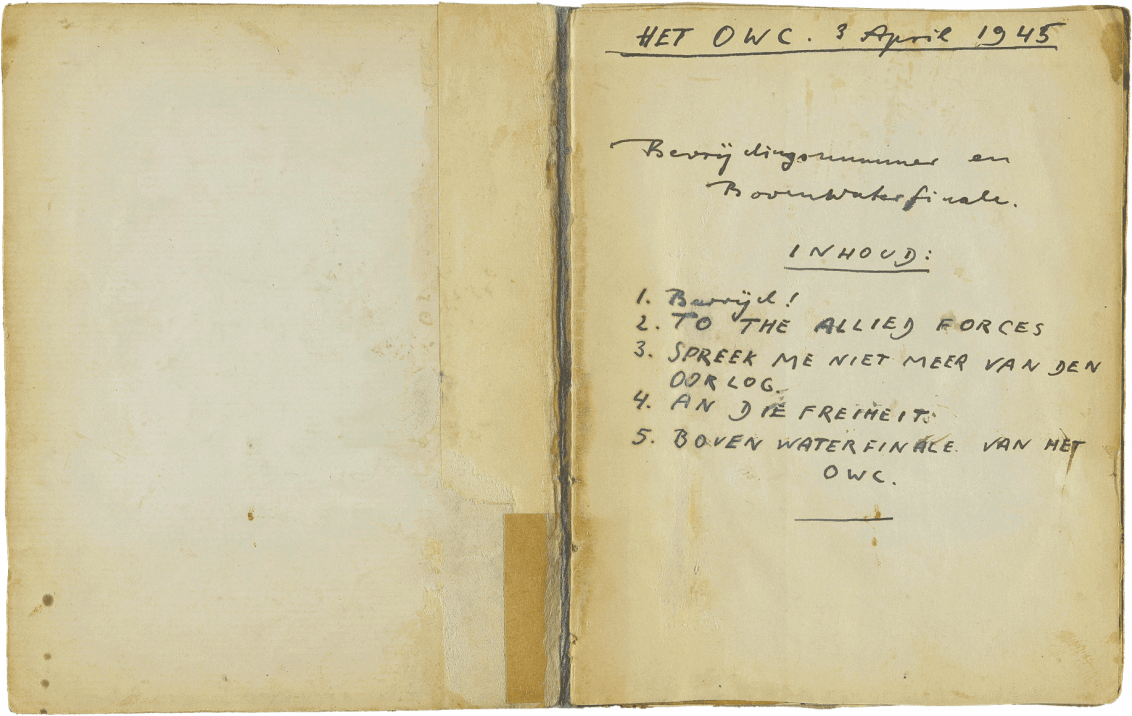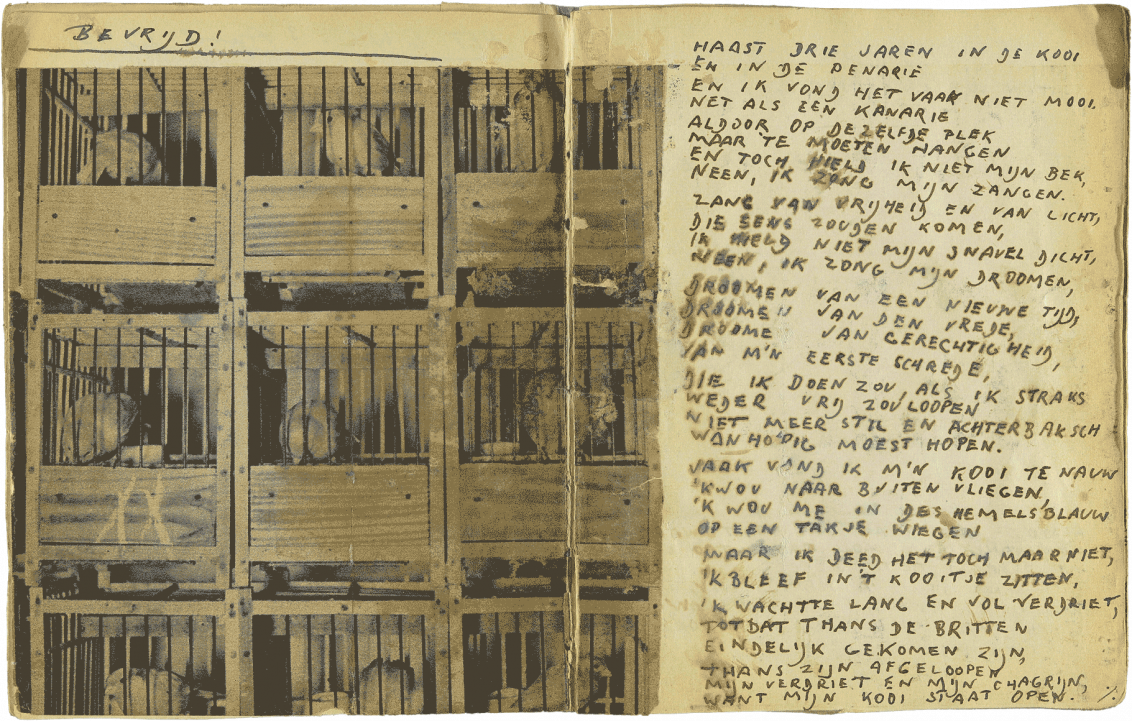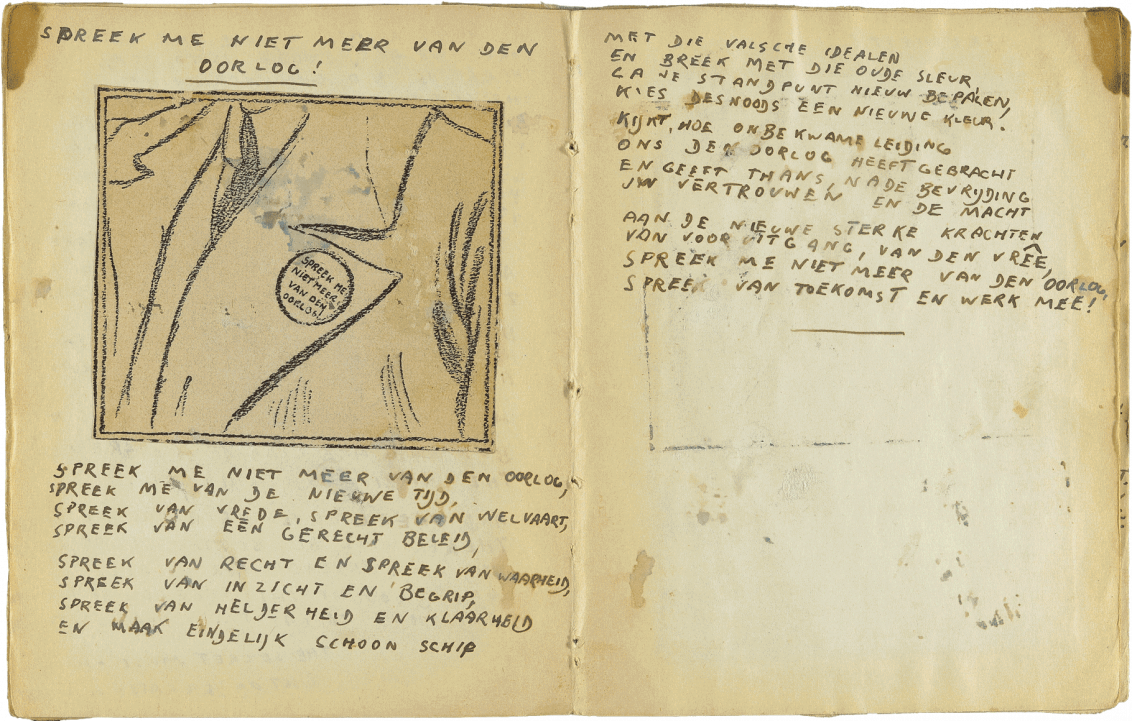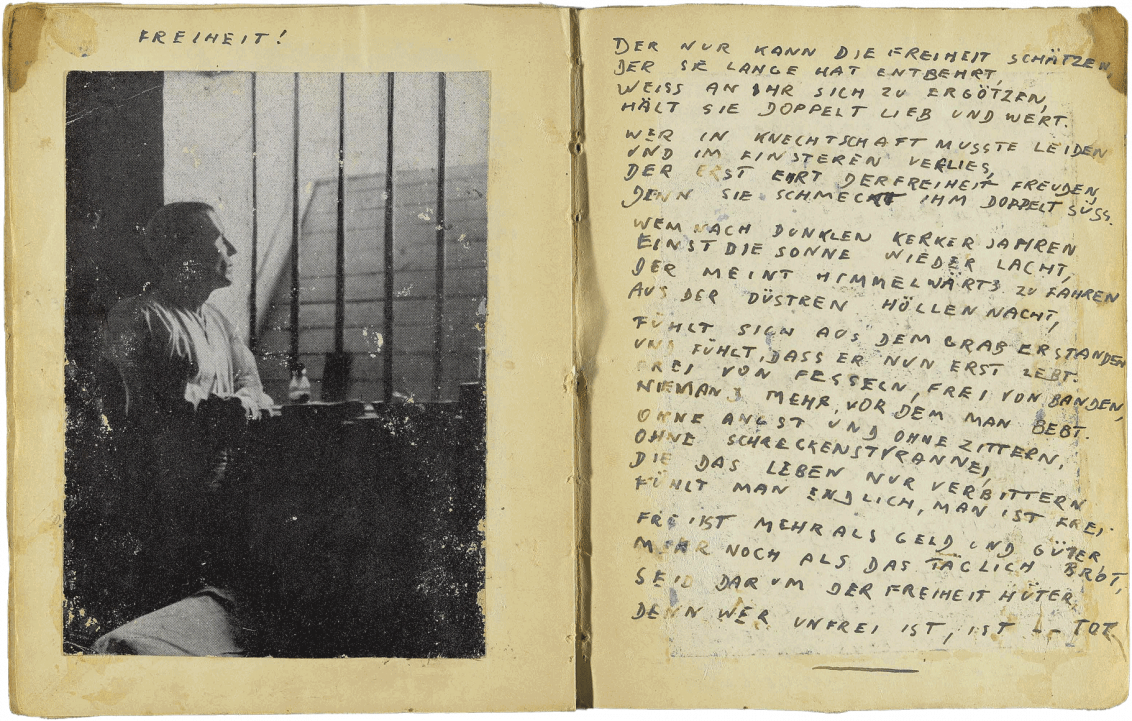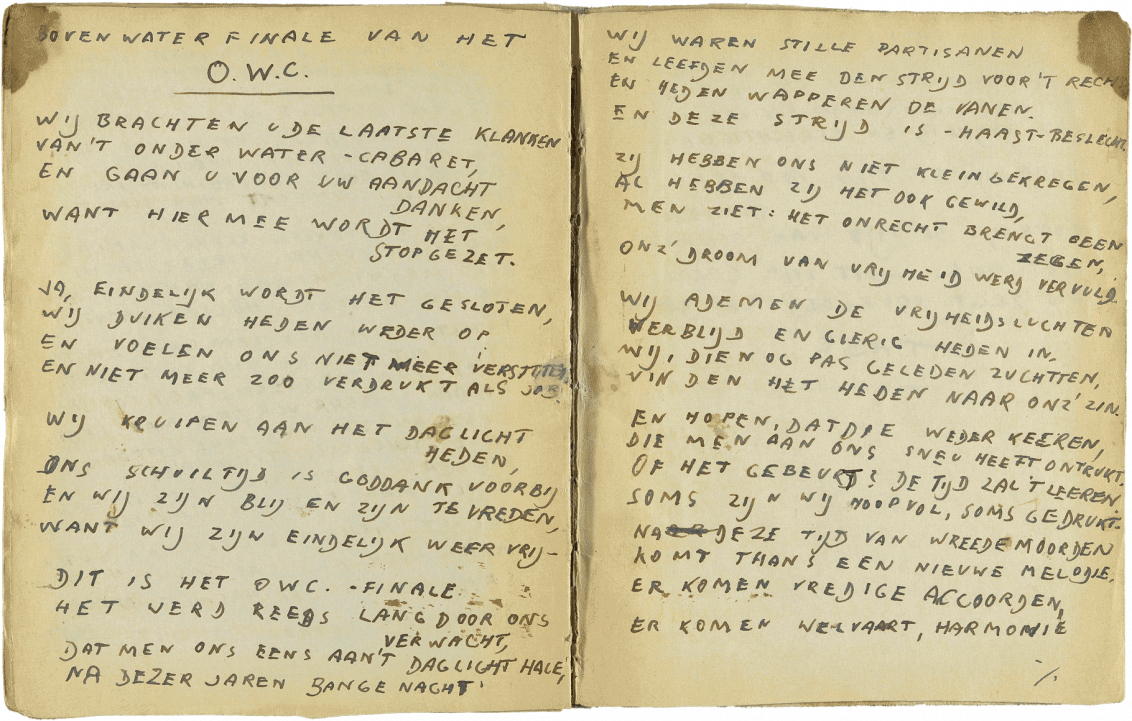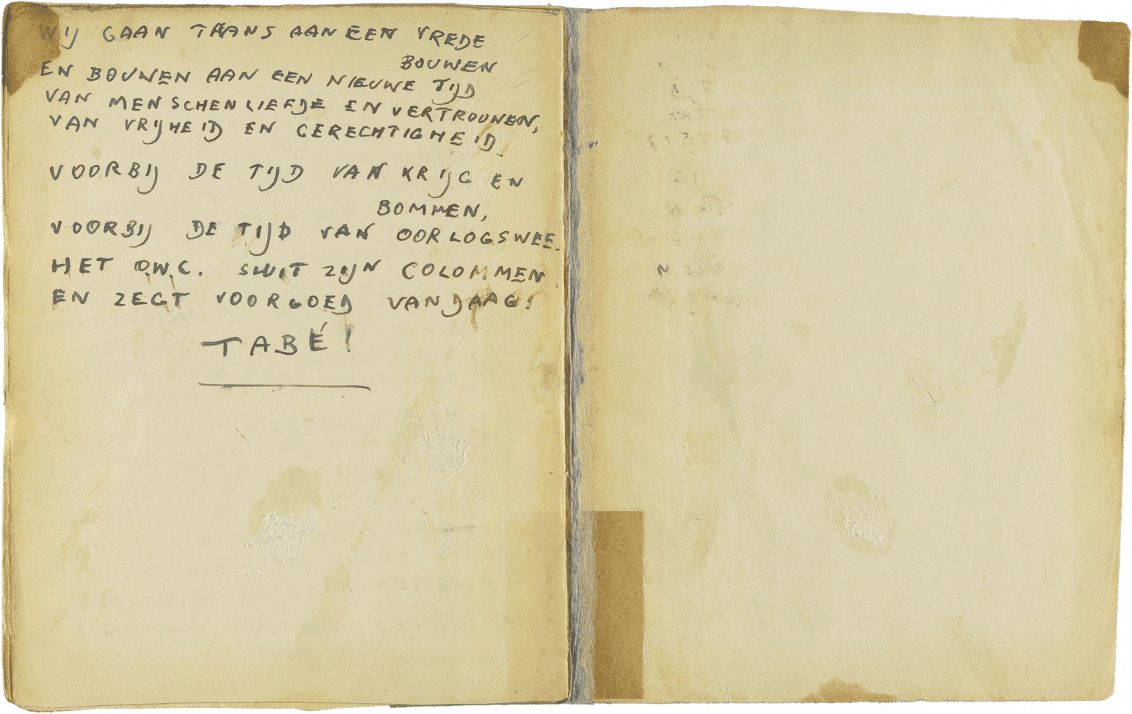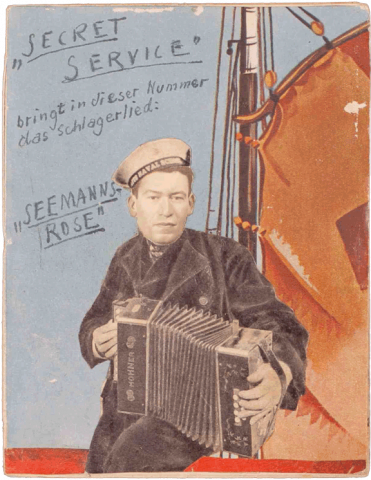
Title pages of the underground magazine Het Onderwater-Cabaret
Het Onderwater-Cabaret
Curt Bloch’s Satirical Underground Magazine and a Glimpse Behind the Scenes of the Exhibition “My Verses Are Like Dynamite”
Over a period of more than nineteen months, between August 1943 and April 1945, Curt Bloch, a German Jew who had gone into hiding in the Netherlands in 1942, created a unique work of creative resistance: a magazine called Het Onderwater-Cabaret (The Underwater Cabaret). Week after week, Bloch crafted little booklets with artfully designed covers, 95 of them in all. Across 483 poems written in Dutch and German, he addressed developments in the Second World War, the circumstances of his life in hiding, the fate of his family, and the crimes of the Nazis and their collaborators. With biting irony and sardonic wit, he set straight the deceptions of Nazi propaganda.
Curt Bloch in Hiding in the Netherlands
One of the 24,000 Jews from Germany who fled to the Netherlands in the 1930s was Curt Bloch, whose career as a lawyer in Germany had been terminated by the Law for the Restoration of the Professional Civil Service of April 1933 and who was also at personal risk due to his left-wing political stance. The Netherland’s geographical proximity, its positive reputation for protecting religious freedom, and its neutrality during the First World War made the country an attractive destination for immigrants – especially since there were hardly any restrictions on German nationals, at least at first. From early 1933 until 1938, when restrictions were placed upon foreigners’ entry and residency options, newcomers did not require a visa and did not face any major obstacles to working.
On 10 May 1940, the German army invaded and occupied the Netherlands. The Jewish refugees were the first to be subjected to arrests, registrations, and forced relocations. Together with his mother and younger sister Helene, who had followed him to the Netherlands in 1939, Curt Bloch had to move to Enschede in the east of the country. On August 25, 1942, about six weeks after the start of the deportations of Jews from the transit camp Westerbork to Auschwitz, he went into hiding in Enschede; his mother and sister hid in Apeldoorn and later in Leiden. In August 1943, Bloch began to publish Het Onderwater-Cabaret from his hiding place. His pen became, in his own telling, his sword.
Who is Curt Bloch?
Curt Bloch (1908–1975), German lawyer and author of the handmade underground magazine Het Onderwater-Cabaret; pseudonym Cornelis Breedenbeek; fled to the Netherlands in 1933; in hiding there from August 1942 onwards
OWC Gallery
This selection of three issues of Onderwater-Cabaret, supplemented by biographical information, historical context, and audio and video recordings of poetry recitations, offer a vivid insight into the unique body of work Bloch created between August 1943 and April 1945. While the poems of the second issue, dated 30 August 1943, are still mostly in Dutch with few illustrations, the issue dated 3 June 1944 and the final one, dated 3 April 1945, each contain numerous poems in German as well as pasted-in newspaper clippings, photographs, and other illustrations.
Het Onderwater-Cabaret, issue dated 30 August 1943
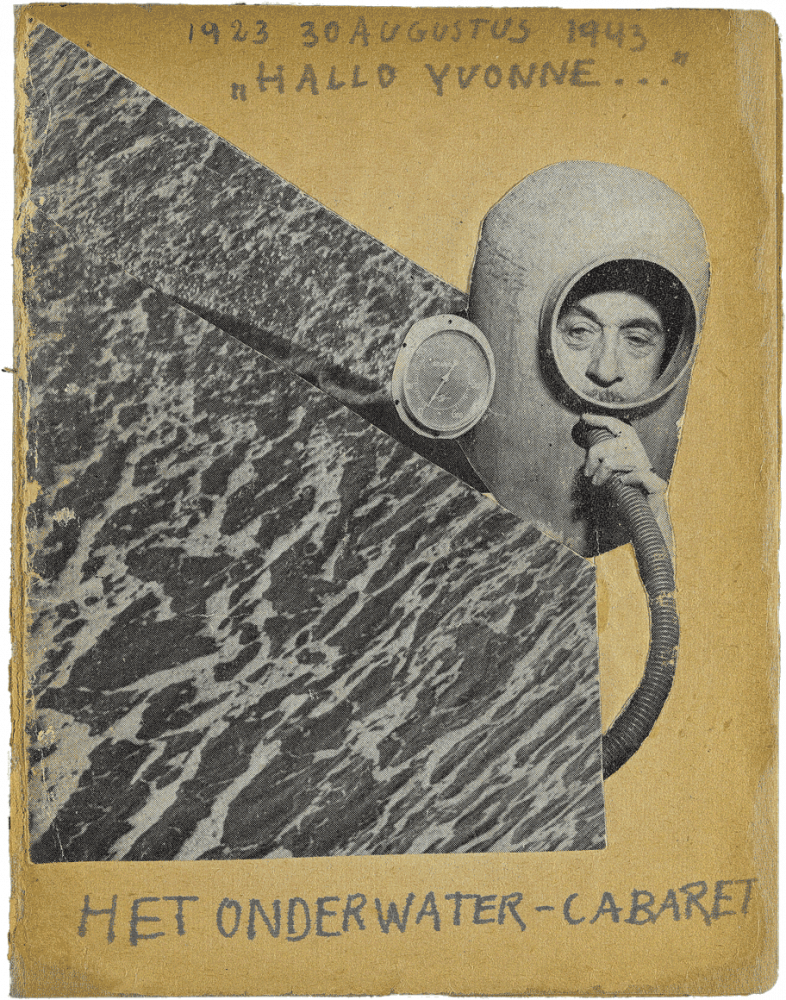
For the front cover of the second issue of the OWC, Curt Bloch used an image of the Spanish pilot and inventor Emilio Herrera wearing the pressure suit he invented, a precursor to the space suit. By adding the surface of the sea to his collage, Bloch transformed the colonel, whose picture he had clipped from a 1935 issue of the Dutch photo magazine Het Leven (The Life), into a diver – a perfect visual metaphor for his Underwater Cabaret.
Front cover, Het Onderwater-Cabaret, issue dated 30 August 1943; Jewish Museum Berlin, collection/816, Curt Bloch Collection, Loan of Charities Aid Foundation America, thanks to the generous support of the family of Curt Bloch
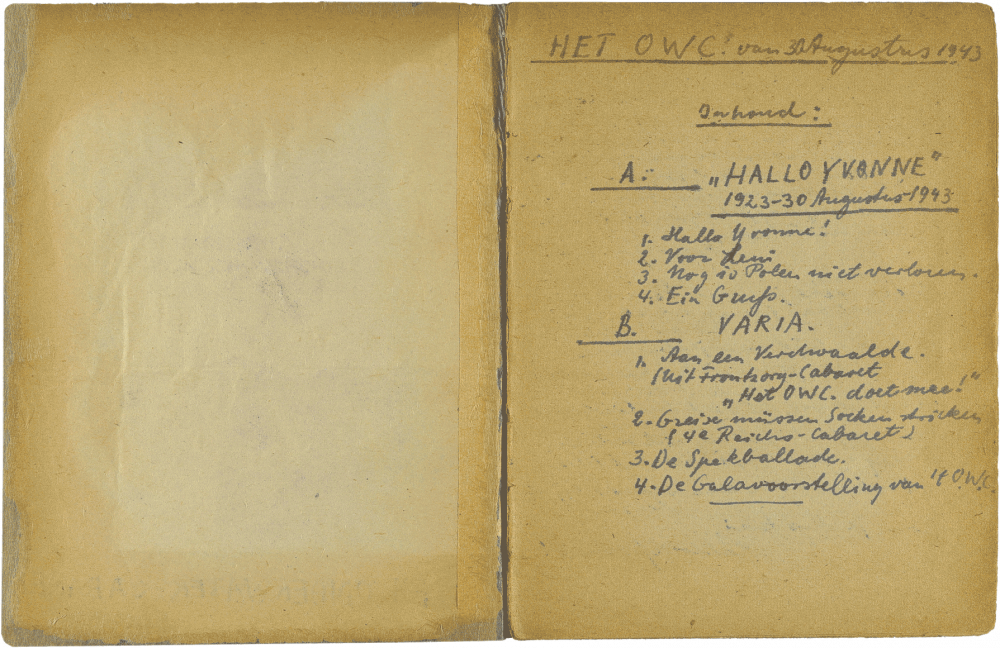
The second issue of the OWC, dated 30 August 1943, stands out for its profound expression of personal emotions and deep concern for the poet’s family, surpassing any other issue. It contains four poems marking the twentieth birthday of Bloch’s youngest sister Helene, known as Leni, about whom he wrote that he was “always very happy that we got along so well and were so close.” (Helene was born on that same date in 1923.)
Several months earlier, in May, Leni had been arrested together with her mother Paula Bloch in their hiding place in the Dutch city of Leiden. Curt Bloch had not heard a word from her since.
Under the line “Varia” (Miscellaneous), the table of contents lists four texts that Bloch calls “time poems” (tijdsgedichten), including the humorous “Bacon Ballad.”
Table of contents of Het Onderwater-Cabaret, issue dated 30 August 1943; Jewish Museum Berlin, collection/816, Curt Bloch Collection, Loan of Charities Aid Foundation America, thanks to the generous support of the family of Curt Bloch
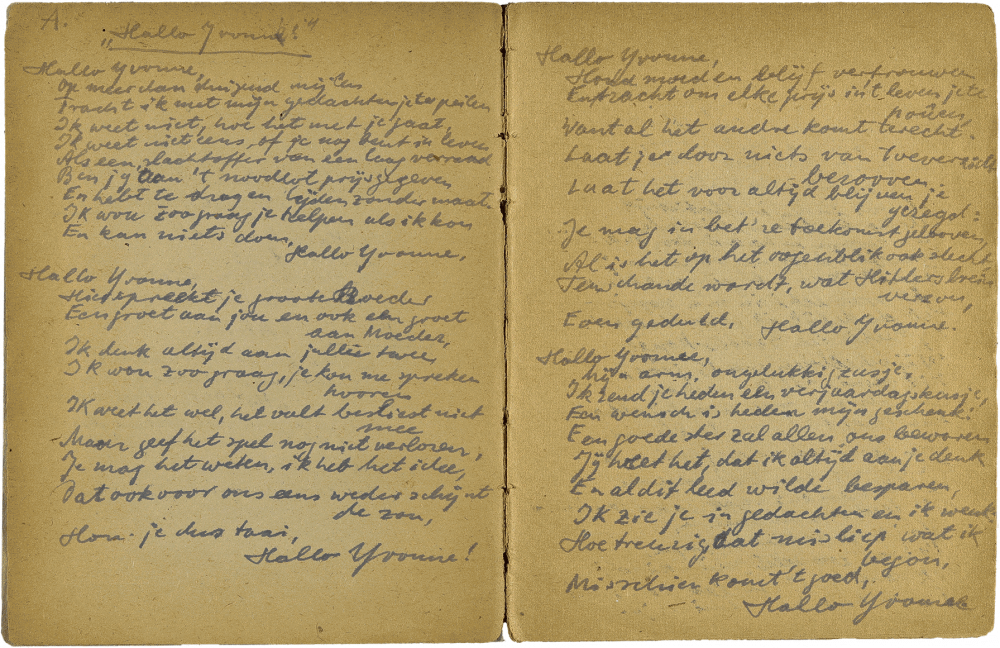
Unable to contact, let alone help, his mother and sister, in “Hallo Yvonne!” (Hello, Yvonne!) Bloch voices words of encouragement and optimism for his sister’s sake and his own. The repetition of the name “Yvonne,” perhaps Leni’s alias while in hiding, serves as an appeal for perseverance.
“Hallo Yvonne!” (Hello, Yvonne!), Het Onderwater-Cabaret, issue dated 30 August 1943; Jewish Museum Berlin, collection/816, Curt Bloch Collection, Loan of Charities Aid Foundation America, thanks to the generous support of the family of Curt Bloch
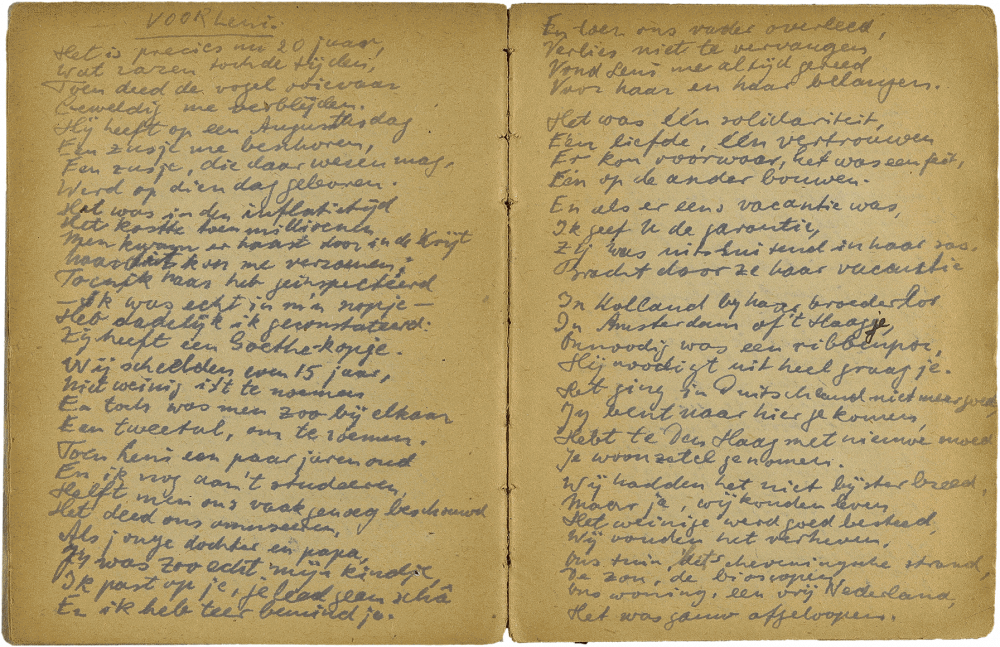
Poignantly, in Voor Leni (For Leni) Bloch recollects the time he shared with his sister, who was fifteen years younger than him and often mistaken for his daughter: from his joy at Leni’s birth to the ups and downs of emigration to the moment they each went into hiding.
Voor Leni (For Leni), Het Onderwater-Cabaret issue dated 30 August 1943; Jewish Museum Berlin, collection/816, Curt Bloch Collection, Loan of Charities Aid Foundation America, thanks to the generous support of the family of Curt Bloch
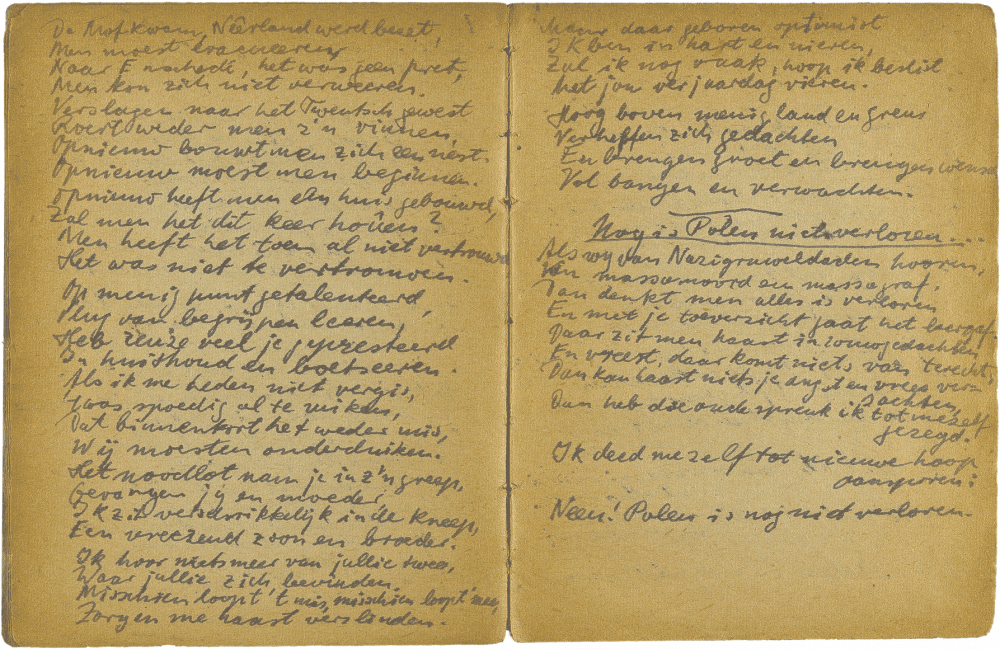
With the line “Nog is Polen niet verloren” (Poland is not yet lost) from the Polish national anthem, made famous by the play of the same name, Bloch refuses to let his knowledge of “massamoord en massagraf” (mass murder and mass grave[s]) snuff out his glimmer of hope for a reunion with his sister.
Nog is Polen niet verloren (Poland Is Not Yet Lost), excerpt, Het Onderwater-Cabaret from 30 August 1943; Jewish Museum Berlin, collection/816, Curt Bloch Collection, Loan of Charities Aid Foundation America, thanks to the generous support of the family of Curt Bloch
When Curt Bloch implored his “little sister” to hold on and stay strong with his silent “greeting,” he had no way of knowing she was no longer alive. On 21 May 1943, two weeks after their arrest in Leiden, Helene and Paula Bloch had been murdered at Sobibor.
Ein Gruß (A Greeting), video excerpt from the stage play On the Piano of My Fantasy with selected poems from Het Onderwater-Cabaret, this one from 30 August 1943, recited by Richard Gonlag; Video thumbnail: Jewish Museum Berlin, collection/816, Curt Bloch Collection, Loan of Charities Aid Foundation America, thanks to the generous support of the family of Curt Bloch
You can watch the entire stage play On the Pianoy of My Fantasy on our website.
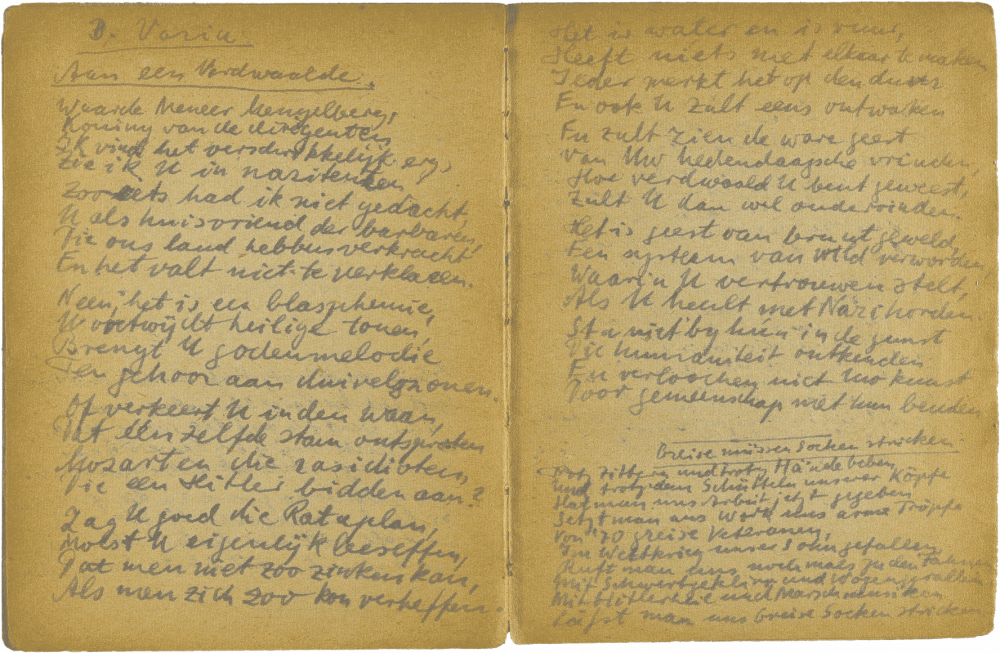
The one “lost” in the title of the poem Aan een verdwaalde (To Someone Lost) refers to Willem Mengelberg, chief conductor of the renowned Amsterdam Concertgebouw Orchestra. In the poem, Bloch condemns as blasphemous Mengelberg’s decision to hold concerts for an audience of high-ranking Nazis.
Aan een verdwaalde (To Someone Lost), Het Onderwater-Cabaret issue dated 30 August 1943; Jewish Museum Berlin, collection/816, Curt Bloch Collection, Loan of Charities Aid Foundation America, thanks to the generous support of the family of Curt Bloch
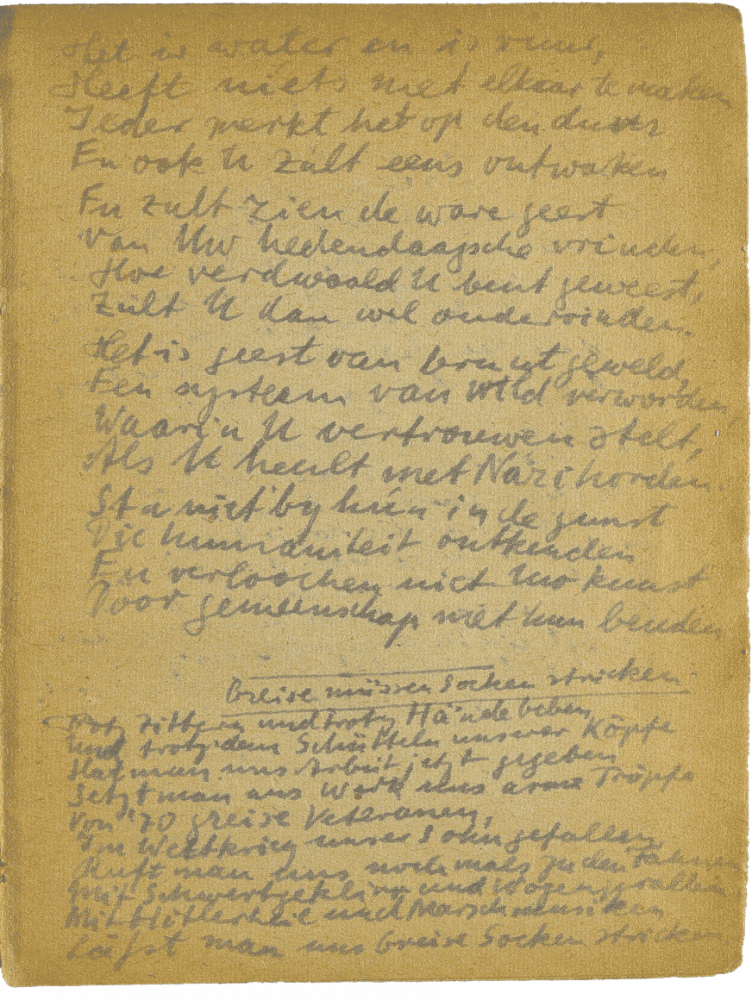
The context of the satirical poem Greise müssen Socken stricken (Old Men Must Knit Socks) is most likely Joseph Goebbels’s December 1941 appeal for German civilians to provide or produce warm clothing for the ill-equipped Wehrmacht serving on the Eastern Front in Russia.
Greise müssen Socken stricken (Old Men Must Knit Socks), excerpt, Het Onderwater-Cabaret issue dated 30 August 1943; Jewish Museum Berlin, collection/816, Curt Bloch Collection, Loan of Charities Aid Foundation America, thanks to the generous support of the family of Curt Bloch
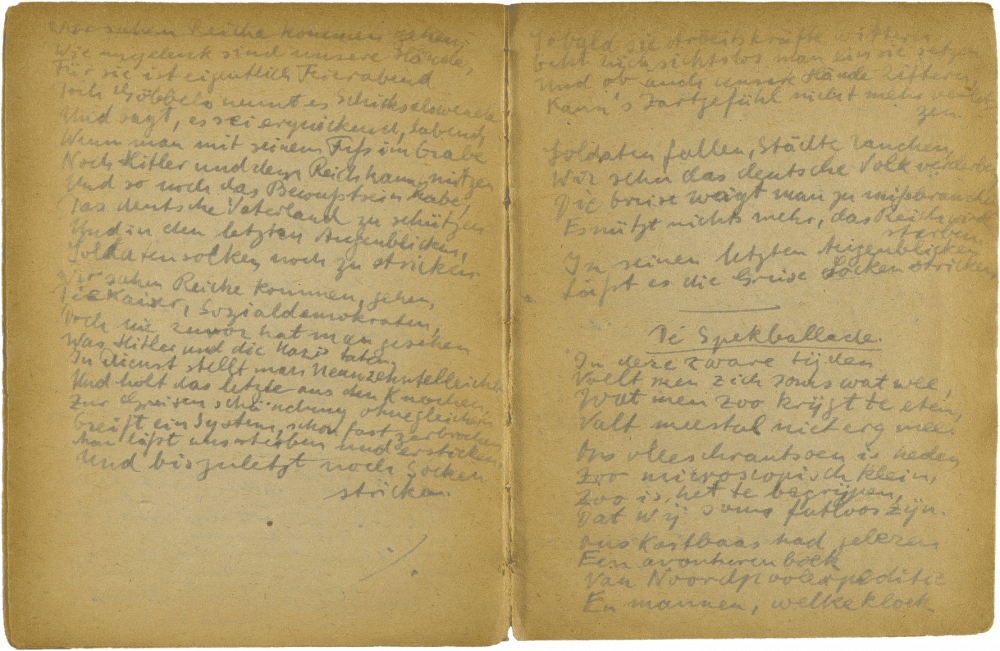
The humor with which Bloch addresses the issue of acquiring food in De spekballade (The Bacon Ballad) is absent in later poems about surviving in hiding. He dedicated the ballad to his friend in hiding, Bruno Löwenberg, alias Jopie, and their helpers Ans and Henk, Anna and Hein(z) Hertzmann.
De spekballade (The Bacon Ballad), excerpt, Het Onderwater-Cabaret from 30 August 1943; Jewish Museum Berlin, collection/816, Curt Bloch Collection, Loan of Charities Aid Foundation America, thanks to the generous support of the family of Curt Bloch
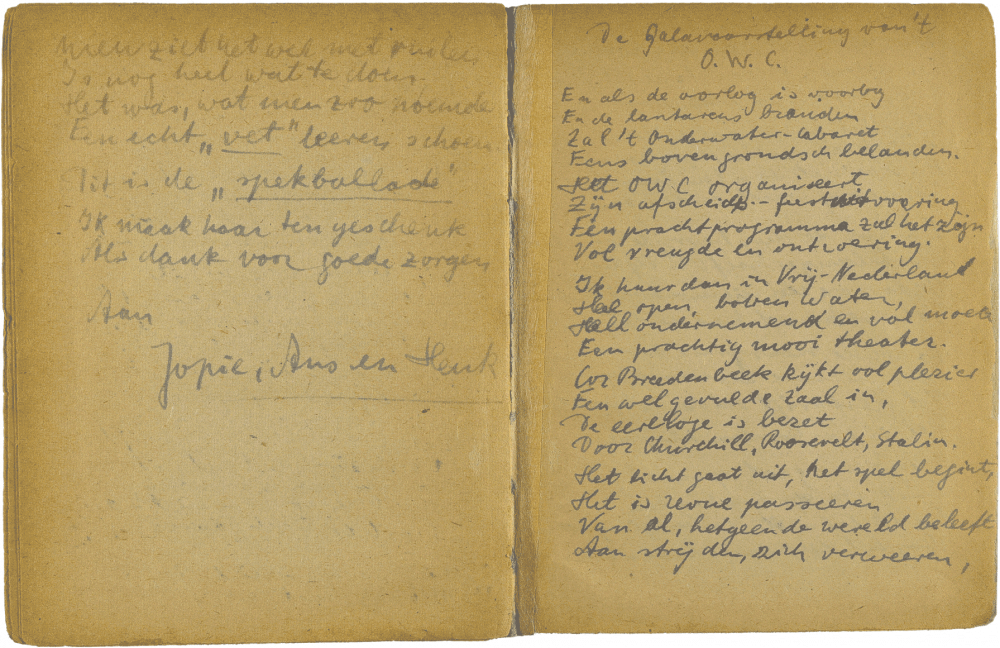
As early as the second issue, Bloch was already imagining a “gala” or farewell performance of the Onderwater-Cabaret with Winston Churchill, Theodore Roosevelt, and Josef Stalin as guests of honor. The Allied landing in Sicily in July 1943 gave him hope that liberation was not too far away.
De Galavoorstelling van’t O.W.C. (The Gala Performance of the OWC), excerpt, Het Onderwater-Cabaret, issue dated 30 August 1943; Jewish Museum Berlin, collection/816, Curt Bloch Collection, Loan of Charities Aid Foundation America, thanks to the generous support of the family of Curt Bloch
Het Onderwater-Cabaret, 3 June 1944 Issue
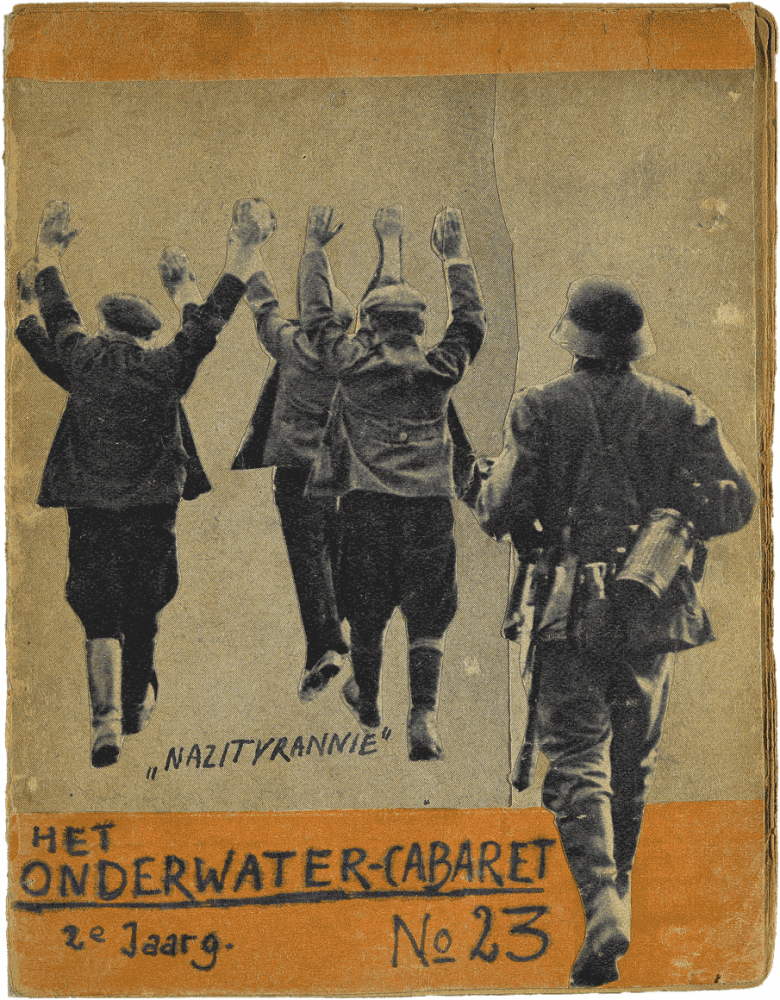
The photo collages on the OWC covers each illustrate a poem in the issue. In connection with the poem Nazityrannie (Nazi Tyranny), Bloch inserted a photo from the first days of the war in September 1939 that depicted armed German soldiers herding Polish civilians down a country road. Cut out and extracted from its specific geographical and historical context, the scene becomes symbolic of the overall violence of the Nazi regime.
Front cover, Het Onderwater-Cabaret issue dated 3 June 1944; Jewish Museum Berlin, collection/816, Curt Bloch Collection, Loan of Charities Aid Foundation America, thanks to the generous support of the family of Curt Bloch
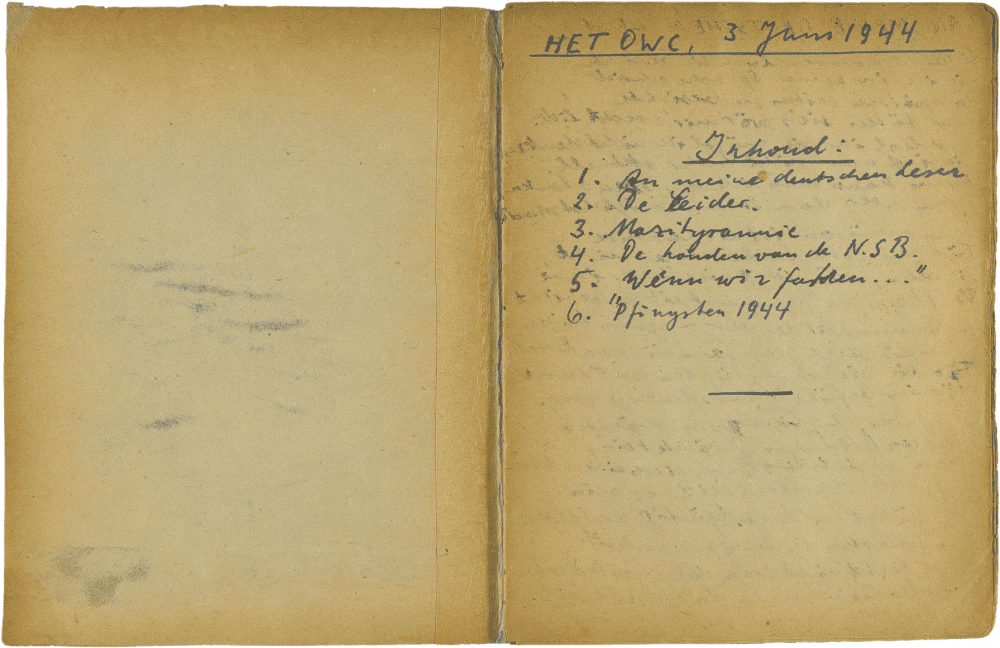
Bloch’s OWC was addressed not only to his actual readership, which was small, but also to future readers. In this forty-second issue, four pieces are addressed to German readers, while two pieces in Dutch are about Dutch collaborators with and supporters of the Nazis.
Table of contents, Het Onderwater-Cabaret dated 3 June 1944; Jewish Museum Berlin, collection/816, Curt Bloch Collection, Loan of Charities Aid Foundation America, thanks to the generous support of the family of Curt Bloch
As the title An meine deutschen Leser (To My German Readers) implies, this poem directly addresses the German readership that Curt Bloch aspired to reach in the future. His hope that his writings would be used for consciousness raising and re-education in postwar Germany did not materialize.
Excerpts from An meine deutschen Leser (To My German Readers), Het Onderwater-Cabaret, 3 June 1944, and O.W.C. Transpiraties (O.W.C. Transpirations), Het Onderwater-Cabaret, 27 January 1945, recited by Richard Gonlag (spoken German and Dutch) and Mathias Schäfer (German Sign Language); Video thumbnail: An meine deutschen Leser, Het Onderwater-Cabaret issue dated 3 June 1944; Jewish Museum Berlin, collection/816, Curt Bloch Collection, Loan of Charities Aid Foundation America, thanks to the generous support of the family of Curt Bloch
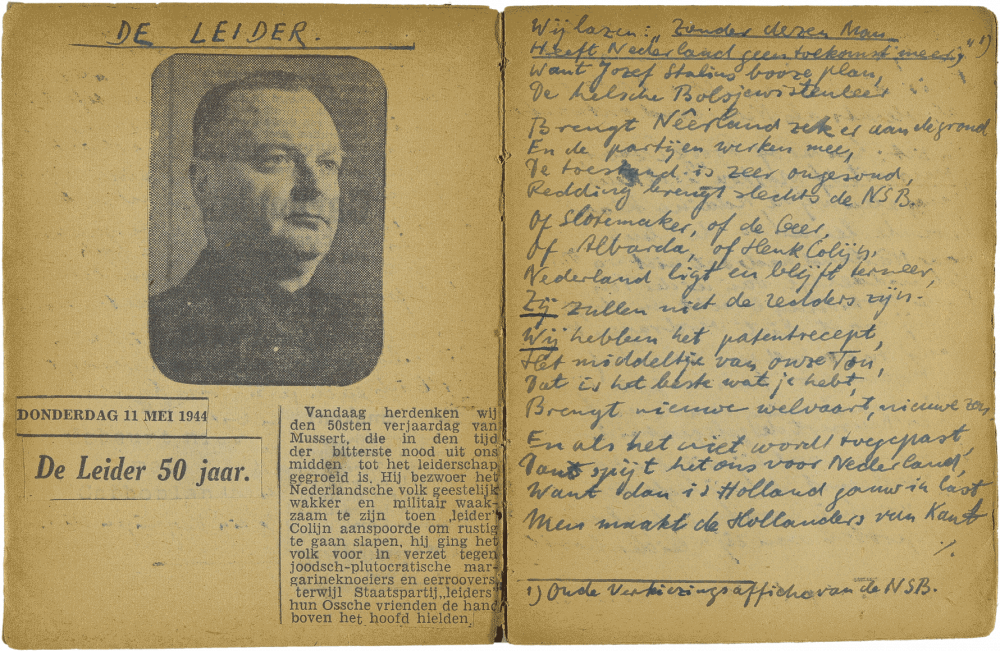
Bloch was prompted to write about Anton Mussert, the head of the Netherlands’ fascist NSB movement, by a newspaper article published on his fiftieth birthday in May 1944. In his poem De Leider (The Leader ), Bloch vehemently disagreed with the article’s claim that the Netherlands had no future without the supposed leader of the Dutch people. Quite the contrary, he argued.
De Leider (The Leader), excerpt, Het Onderwater-Cabaret, issue dated 3 June 1944; Jewish Museum Berlin, collection/816, Curt Bloch Collection, Loan of Charities Aid Foundation America, thanks to the generous support of the family of Curt Bloch
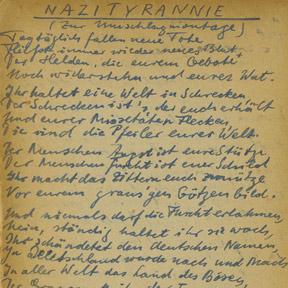
In Nazityrannie (Nazi Tyranny), Bloch vociferously denounces the Nazi regime of violence and terror, which, he asserts, could not kill freedom despite all its atrocities.
Nazityrannie (Nazi Tyranny), Het Onderwater-Cabaret, issue dated 3 June 1944, recited by Richard Gonlag, Image: Jewish Museum Berlin, collection/816, Curt Bloch Collection, Loan of Charities Aid Foundation America, thanks to the generous support of the family of Curt Bloch
English translation: Nazi Tyranny
More people die each passing day
More blood is spilled relentlessly
From heroes who defy your will
Who still resist you and your rage.
You keep the planet horrified
So horror’s what you shall receive
For your misdeeds, those stubborn stains,
Are pillars holding up your world.
The people’s panic props you up
The people’s terror is your shield
You put their trembling to use
Atop your grisly, morbid shrine.
You never let the terror fade,
Oh no, you keep it strong, alive,
As you defame the German name.
By now, the world sees Germany
As evil’s land, the headquarters
Of cruelty and tyranny.
The world has seen your German ways,
And what they’ve seen they shan’t forget.
You’ve rounded up the multitudes,
You’ve flushed them out from hiding spots,
From everywhere and all around,
And yet you haven’t reached your goal.
You’ve tortured and you’ve fired your guns,
You’ve wounded, maimed, and massacred.
The world is gushing with red blood
Because of figments of your mind.
Long sprees of theft and butchery,
Of ghastliness and savagery,
Are now, for you, affairs of state.
The murderers became police.
When people fight for liberty
They’re hunted down like criminals
Until you end their misery:
Your rifles have the final say.
They speak in the new German tongue
The cant of Nazi tyranny
And yet revenge won’t pass you by.
No, somehow it will reach you too.
As though alive, the bloodstained earth
Will speak to you vile murderers:
For freedom fighters you may kill,
But liberty shall never die.
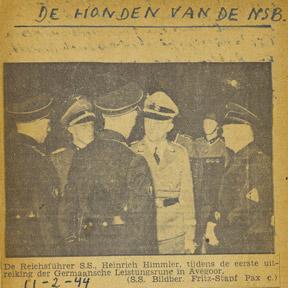
Curt Bloch lambasted the members of the Dutch fascist NSB movement as “De honden van de N.S.B.” (The Dogs of the NSB), as the German occupiers’ tracking dogs who were betraying their own compatriots.
De honden van de N.S.B. (The Dogs of the NSB), excerpt, Het Onderwater-Cabaret, issue dated 3 June 1944, recited by Richard Gonlag, Image: Jewish Museum Berlin, collection/816, Curt Bloch Collection, Loan of Charities Aid Foundation America, thanks to the generous support of the family of Curt Bloch
English translation: The Dogs of the NSB
The sniffing dogs of the enemy,
The dogs of the NSB.
Pan-Germanic to the letter
They serve humbly and with meekness.
Look how they sniff, how they search,
Brimming with canine senses,
In hunting they can find their taste
Those NSB hounds.
But these dogs, they hunt for people,
It seems to bring them thrill and joy
And it’s pleasing to the Brownshirts,
Their fatherland concerns them not.
They search and sniff and offer paws,
They show their well-trained tricks
And betray their countrymen
With espionage and barking
They do one thing and do another,
Not bothered by shame and blame
And many good Dutchmen
Are turned in to the Germans by their hand.
Thus, they loyally work for the occupier
And act like they are themselves the chiefs
While in truth they are in chains
Piet knows that, and so does Klaas.
Nonetheless, they pose a danger
And fearfully we watch out for them,
Most people truly tremble
When an NSB hound sniffs.
To the occupier is connected
Their fate and their well-being,
They are the chained dogs of the Nazis,
The dogs of the NSB.
P.S. Reread what I have written,
I offer my apologies to my dog,
For it rises above and beyond,
Such an NSB hound.
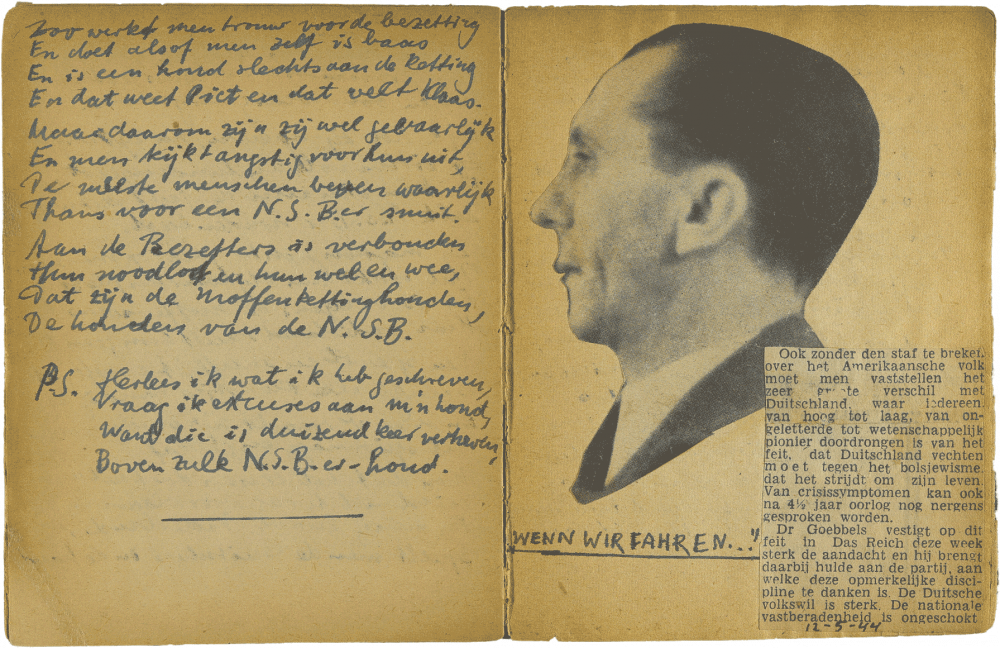
Bloch reported that engaging with day-to-day politics inevitably brought him into constant conflict with German propaganda, turning the OWC “almost automatically” into “one single polemic” against the German Propaganda Minister Joseph Goebbels. “When we go …” is one of the many “anti-Joseph poems,” in which Bloch debunks Goebbels’s lies and slogans.
“Wenn wir fahren ...“ (“When we go…“), excerpt, Het Onderwater-Cabaret, issue dated 3 June 1944; Jewish Museum Berlin, collection/816, Curt Bloch Collection, Loan of Charities Aid Foundation America, thanks to the generous support of the family of Curt Bloch
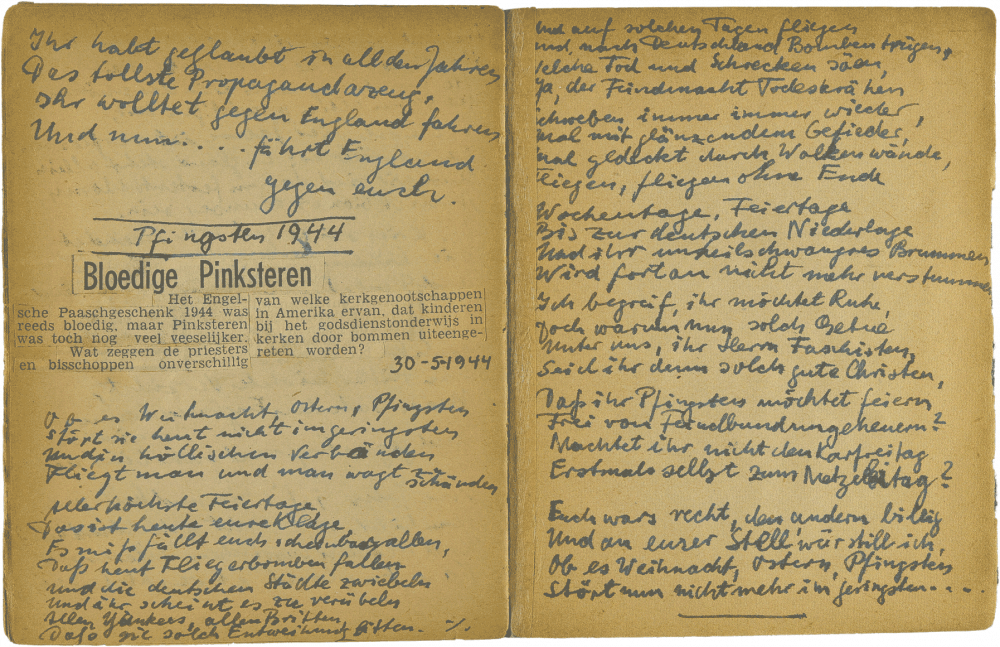
Prompted by a newspaper article in the Twentsch Nieuwsblad, Bloch’s main source, in Pfingsten 1944 (Pentecost 1944) Bloch mocked the German desire for a holiday break from Allied bombardments. (Pentecost, a Christian holiday also known as Whitsun, fell in late May that year, coinciding with the Jewish holiday of Shavuot.) On the contrary, Bloch predicted that the “foreboding drone” of Allied planes over Germany would not cease until the Germans were defeated.
Pfingsten 1944 (Pentecost 1944), Het Onderwater-Cabaret, issue dated 3 June 1944; Jewish Museum Berlin, collection/816, Curt Bloch Collection, Loan of Charities Aid Foundation America, thanks to the generous support of the family of Curt Bloch
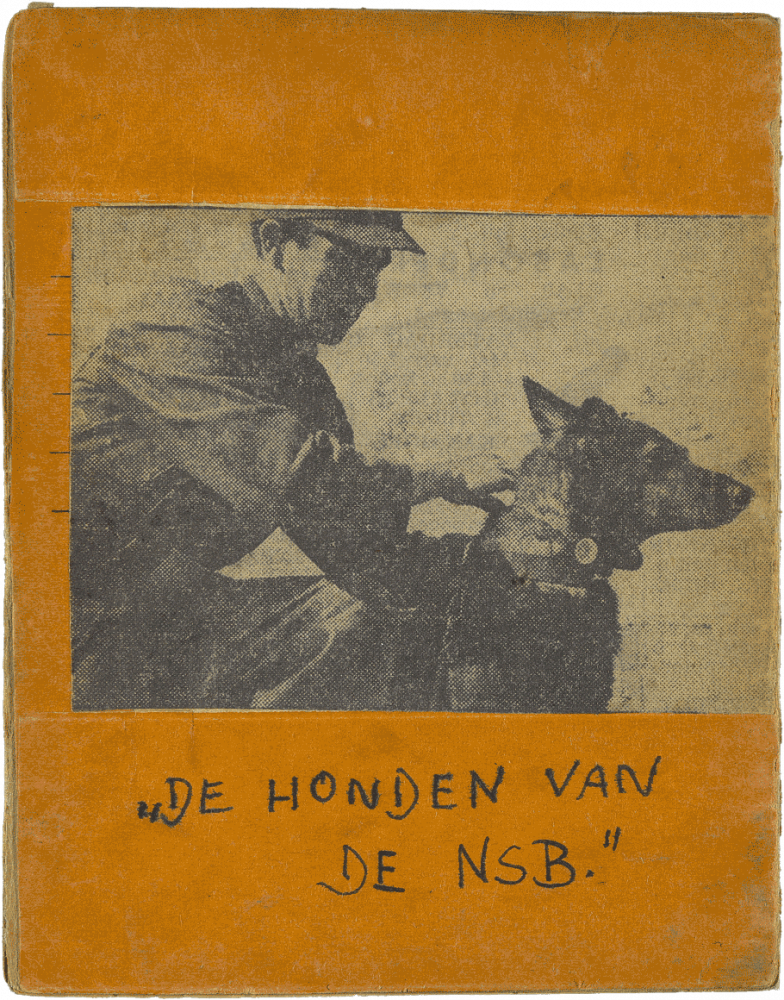
Curt Bloch very rarely included images on the back covers of the OWC. For the poem “De honden van de NSB,” however, he pasted the photo of a Dutch volunteer with a dog there. This was an illustration from the Twentsch Nieuwsblad, originally accompanying an appeal to enlist in the fight against Bolshevism.
Back cover, Het Onderwater-Cabaret, issue dated 3 June 1944; Jewish Museum Berlin, collection/816, Curt Bloch Collection, Loan of Charities Aid Foundation America, thanks to the generous support of the family of Curt Bloch
Het Onderwater-Cabaret, issued dated 3 April 1945
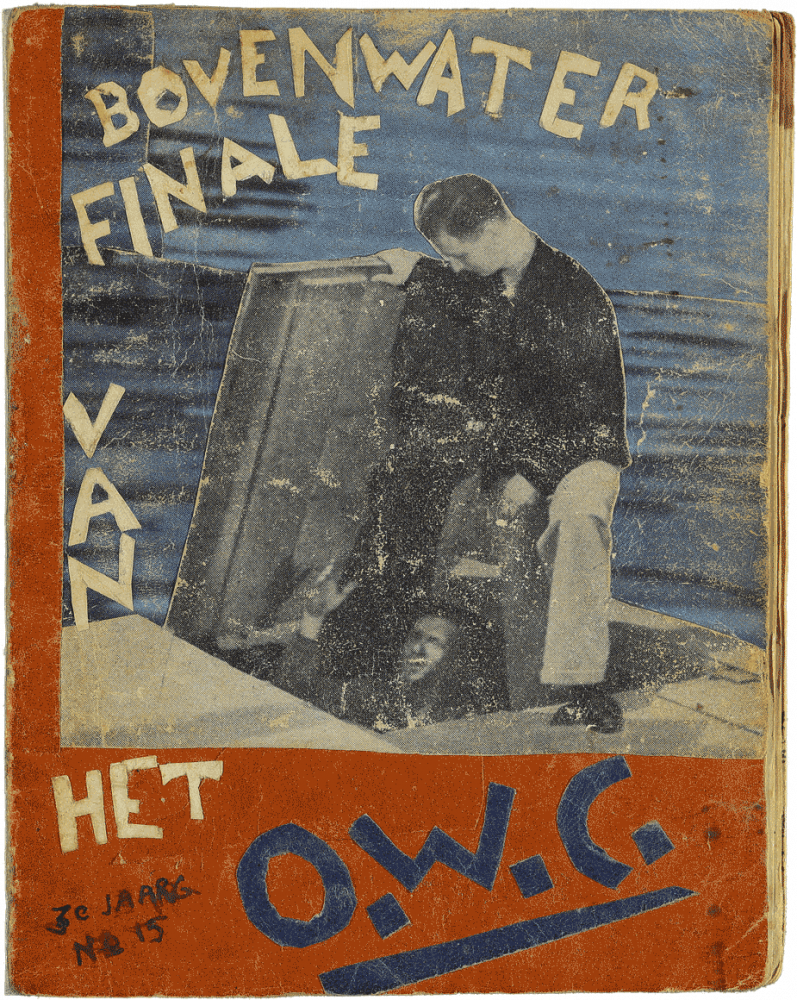
On 3 April 1945, British troops liberated the small town of Borne near Enschede, where Curt Bloch had been hiding since December 1944. After more than nineteen months, he was finally able to leave his hideaway and step into the light of day – just like the two men on the cover. Bloch gave the ninety-fifth and final issue of the OWC the date of his liberation and the title Bovenwater Finale van het OWC, or “Above-water Finale of the OWC.”
Front cover, Het OWC, issue dated 3 April 1945; Jewish Museum Berlin, collection/816, Curt Bloch Collection, Loan of Charities Aid Foundation America, thanks to the generous support of the family of Curt Bloch
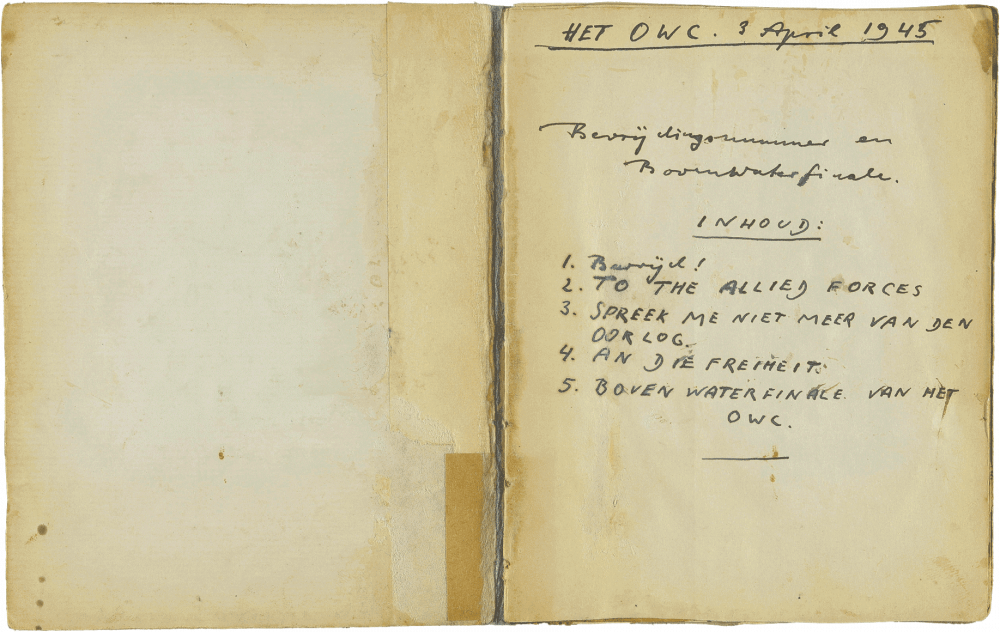
Curt Bloch had likely written the poems for the last issue, also called the “Bevrijdingsnummer” (liberation issue), weeks or even months in advance as he longingly awaited the end of the war and his return to freedom. With corresponding illustrations for almost all the poems, the Bovenwater Finale rises above the other issues in the quality of its presentation.
Table of contents, Het OWC, issue dated 3 April 1945; Jewish Museum Berlin, collection/816, Curt Bloch Collection, Loan of Charities Aid Foundation America, thanks to the generous support of the family of Curt Bloch
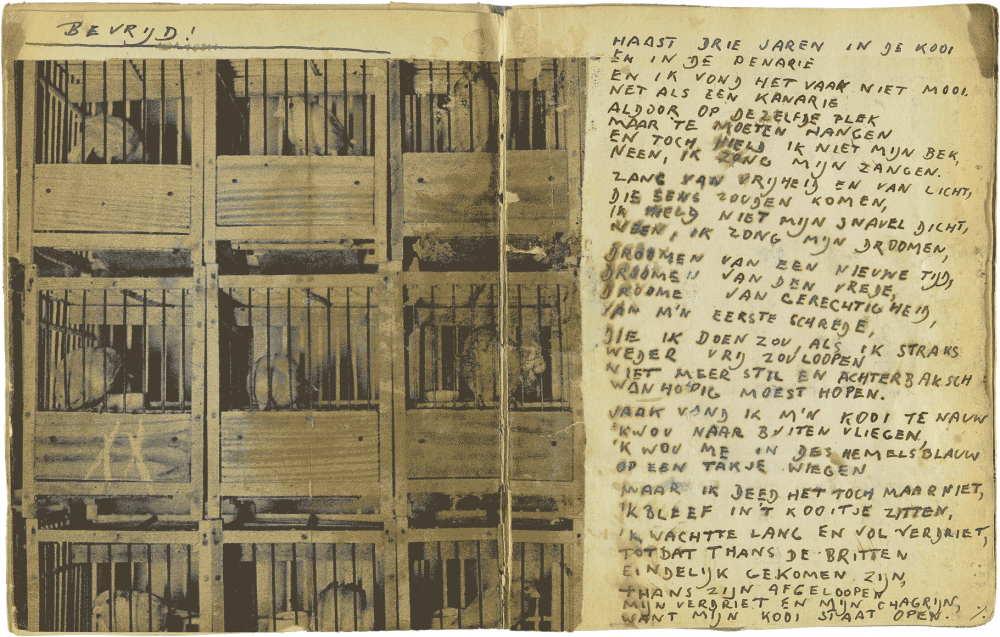
Clearly inspired by the illustration of bird cages he pasted in, Bloch wrote the poem Bevrijd! (Liberated!) in which he draws parallels between a caged canary and his life in hiding.
Beginning in late January 1945, Bloch wrote in all capital letters. Perhaps he wished to improve the OWC’s legibility for his audience at his new hiding place.
Bevrijd! (Liberated!), excerpt, Het OWC, issue dated 3 April 1945; Jewish Museum Berlin, collection/816, Curt Bloch Collection, Loan of Charities Aid Foundation America, thanks to the generous support of the family of Curt Bloch
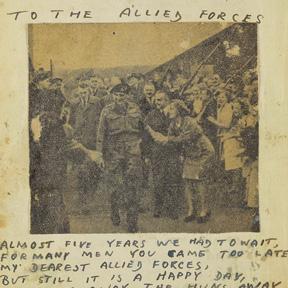
The only English poem in the entire OWC called To the Allied Forces is illustrated with an image from the Dutch underground newspaper Ons Volk (Our People). Photographed during a visit to a munitions factory in England, General Bernard Law Montgomery, commander of the invading British army, becomes the celebrated liberator in the context of Bloch’s poem. At the same time, the poem alludes to the long wait and points out that liberation came too late for many.
To the Allied Forces, Het OWC, issue dated 3 April 1945, recited by Richard Gonlag, Image: Jewish Museum Berlin, collection/816, Curt Bloch Collection, Loan of Charities Aid Foundation America, thanks to the generous support of the family of Curt Bloch
Audio as text (in English)
Almost five years we had to wait,
For many men you came too late,
My dearest Allied Forces,
But still it is a happy day,
The Huns away, the Huns away
With cars and bikes and horses.
The Huns away and we are free,
Sorry we are, there is no tea,
There is no gin nor wine,
The German took it all away,
But still it is a happy day,
You took the Siegfried-Line.
With Patton and Montgomery
You’re taking Western Germany.
It is no fairy tale,
Within a few days you’ll shake hands
At Berlin with our Russian friends,
The German nightingale,
Herr Hitler, doesn’t sing to-day
He’s feeling after some delay
Around his neck a tie.
He’ll be hung up, that makes him sad,
But we are glad, yes we are glad,
The Nazi-gang will die.
And there will be a time of peace,
There will be butter, sugar, cheese
And … freedom for us all.
You brought this freedom by your tanks
And thus to-day. I’m screaming: thanks.
The secret Music-Hall
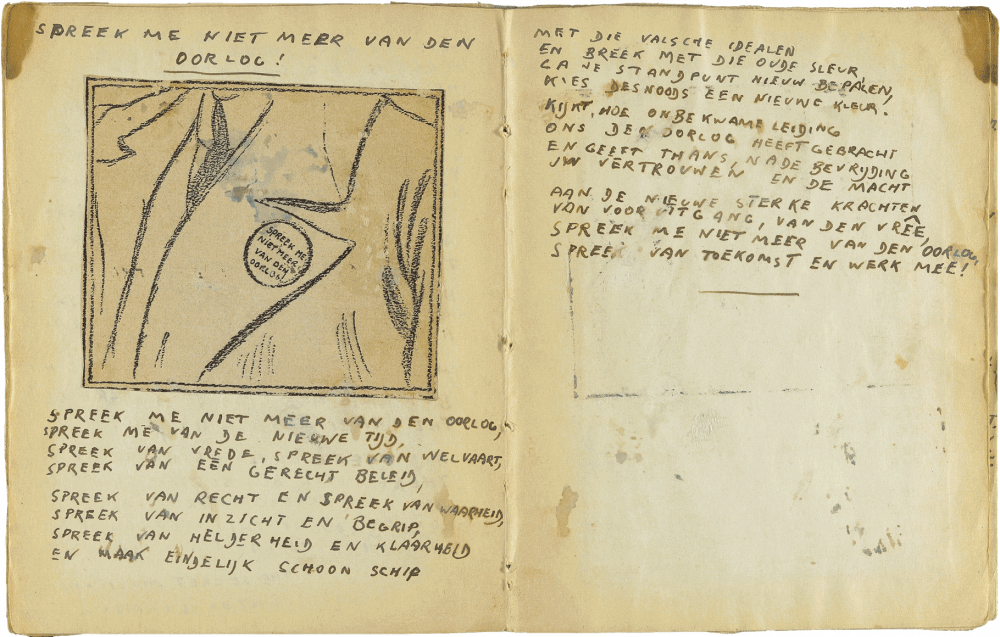
The pasted-in drawing by Leendert Jurriaan Jordaan, one of the Netherlands’ most famous political cartoonists, had been printed in the Dutch illustrated magazine Het Leven (The Life) in October 1935. Since Curt Bloch had already used a cartoon from the same issue in the OWC in late 1943, it is quite conceivable that he set aside this drawing for the final issue at that early date.
Spreek me niet meer van oorlog (Don’t Talk to Me About the War Anymore), Het OWC, issue dated 3 April 1945; Jewish Museum Berlin, collection/816, Curt Bloch Collection, Loan of Charities Aid Foundation America, thanks to the generous support of the family of Curt Bloch
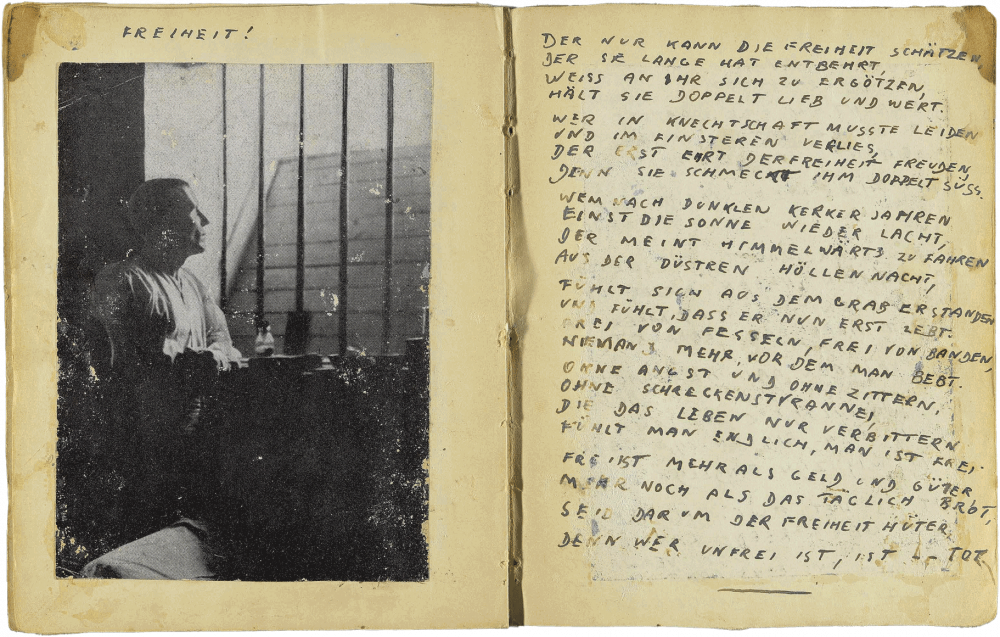
In the context of its author having endured years of tyranny and “slavery in the dark dungeon,” the poem An die Freiheit (To Freedom) passionately advocates for the vigilant protection of freedom.
An die Freiheit (To Freedom), Het OWC, issue dated 3 April 1945; Jewish Museum Berlin, collection/816, Curt Bloch Collection, Loan of Charities Aid Foundation America, thanks to the generous support of the family of Curt Bloch
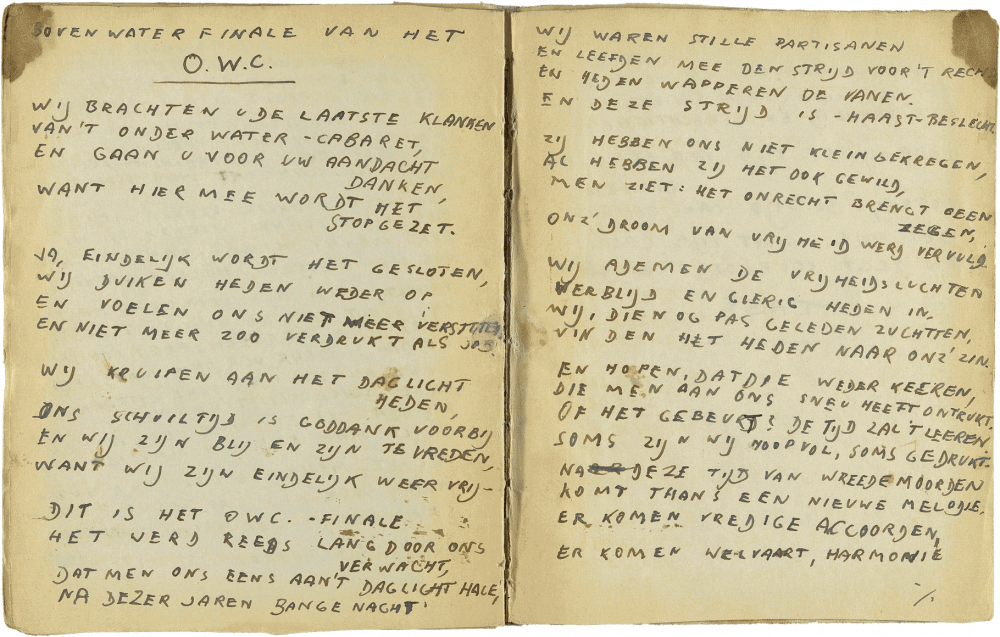
Between August 1943 and April 1945, Curt Bloch nearly gave up on publishing the OWC several times: “The gradual decline of the Third Reich’s power is observable, but that is not enough to fill the pages of OWCs. Thus [we face] a crisis, a new crisis for the OWC….”
Bovenwaterfinale van het OWC (Above-water Finale of the OWC), Het OWC, issue dated 3 April 1945; Jewish Museum Berlin, collection/816, Curt Bloch Collection, Loan of Charities Aid Foundation America, thanks to the generous support of the family of Curt Bloch
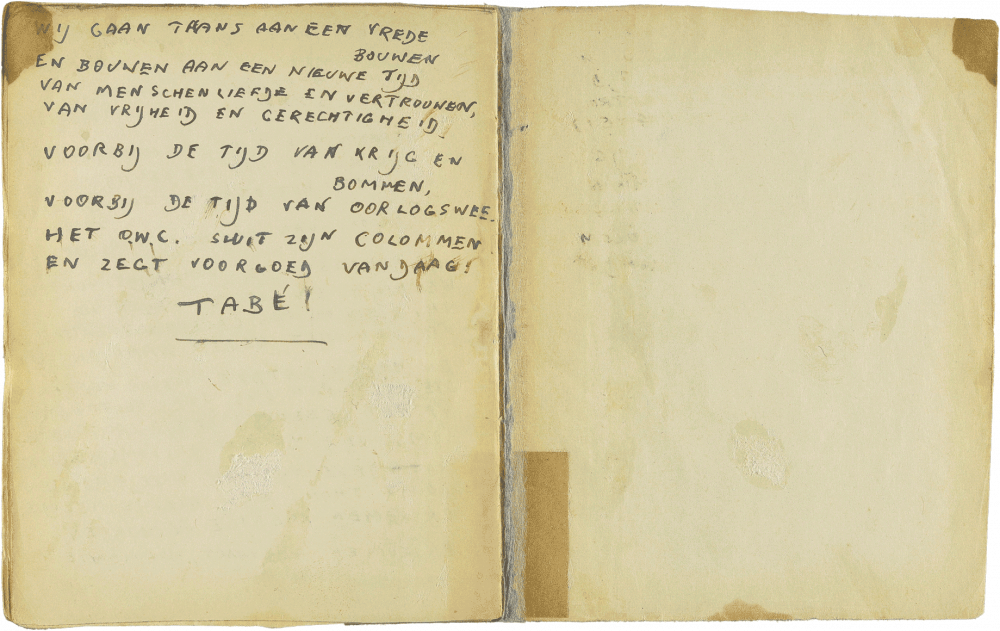
Signing off with a heartfelt “Tabé!” (farewell), Bloch finally completed the last page of his OWC after liberation. Amidst many conflicting emotions ranging from hope to despair, Bloch struck an optimistic tone, convinced that a new age was dawning — one filled with human kindness and trust, freedom and justice.
Bovenwaterfinale van het OWC (Above-water Finale of the OWC), Het OWC, issue dated 3 April 1945; Jewish Museum Berlin, collection/816, Curt Bloch Collection, Loan of Charities Aid Foundation America, thanks to the generous support of the family of Curt Bloch
Who read the OWC?
Curt Bloch spent most of his period in hiding at the home of Albertus and Aleida Menneken in Enschede. In the autumn of 1942, the couple additionally took in Bloch’s friends Karola Wolf (1920–2015) and Bruno Löwenberg (1898–1986). After Karola Wolf was forced to change hiding places in May 1943, Curt Bloch, who had fallen in love with her, sent her sealed letters and poems via couriers. In August 1943, he composed the first of a total of thirty-seven booklets under the title Secret Service. Together with these booklets of love poems for Karola Wolf, Bloch also enclosed issues of Het Onderwater Cabaret (OWC) with its predominantly satirical content. Occasionally, Bloch sent batches of several “OWC issues” to his first reader and critic, Karola Wolf. For more than seven months, Bloch worked on both magazines using the same format.
Although the Mennekens, Bruno Löwenberg, and other friends and visitors to the house knew about and read the OWC, Bloch kept Secret Service strictly confidential. The romance ended in March 1944. Bloch ceased working on Secret Service but continued to correspond closely with Karola Wolf, still sending her issues of the OWC. His numerous letters, carefully preserved by Karola Wolf, provide insightful glimpses into Bloch’s work on the OWC and other writings.
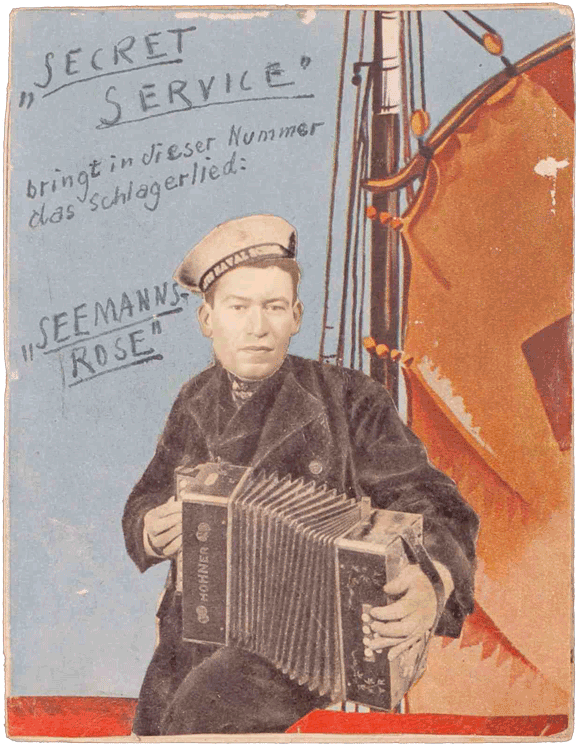 X
X
Secret Service no. 27, Seemannsrose (Sailor’s Rose), February 1944; Jewish Museum Berlin, accession 2023/141/26, gift of Robert Saunders
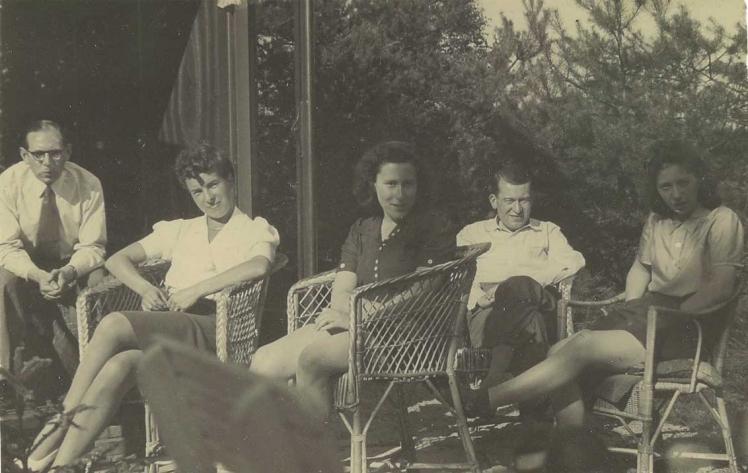
From left to right: Bruno Löwenberg, an unknown woman, Helene Bloch, Curt Bloch, and Karola Wolf, probably taken in the summer of 1941; Jewish Museum Berlin, accession TE83 (OndCab)/29, gift of Robert Saunders
The Conservation of the OWC Booklets
Before emigrating from the Netherlands to the United States, Curt Bloch had the ninety-five issues of Het Onderwater-Cabaret bound. In January 2023, four volumes of Het Onderwater-Cabaret and a fifth volume with additional writings arrived at the Jewish Museum Berlin. The individual booklets were carefully separated and conservated to facilitate their use in research and exhibitions.
Paper conservator Stephan Lohrengel gives a glimpse of work behind the scenes, and curators Aubrey Pomerance and Ulrike Kuschel explain the opportunities this conservation opens up for the exhibition and research (in German with English subtitles); Jewish Museum Berlin 2024, script, camera and editing: Peter Wollring
After all, Het Onderwater-Cabaret is very relevant today in a world pervaded by war, disinformation, discrimination, exclusion, and persecution.
Citation recommendation:
Ulrike Kuschel/Jewish Museum Berlin (2024), Het Onderwater-Cabaret. Curt Bloch’s Satirical Underground Magazine and a Glimpse Behind the Scenes of the Exhibition “My Verses Are Like Dynamite”.
URL: www.jmberlin.de/en/node/10232
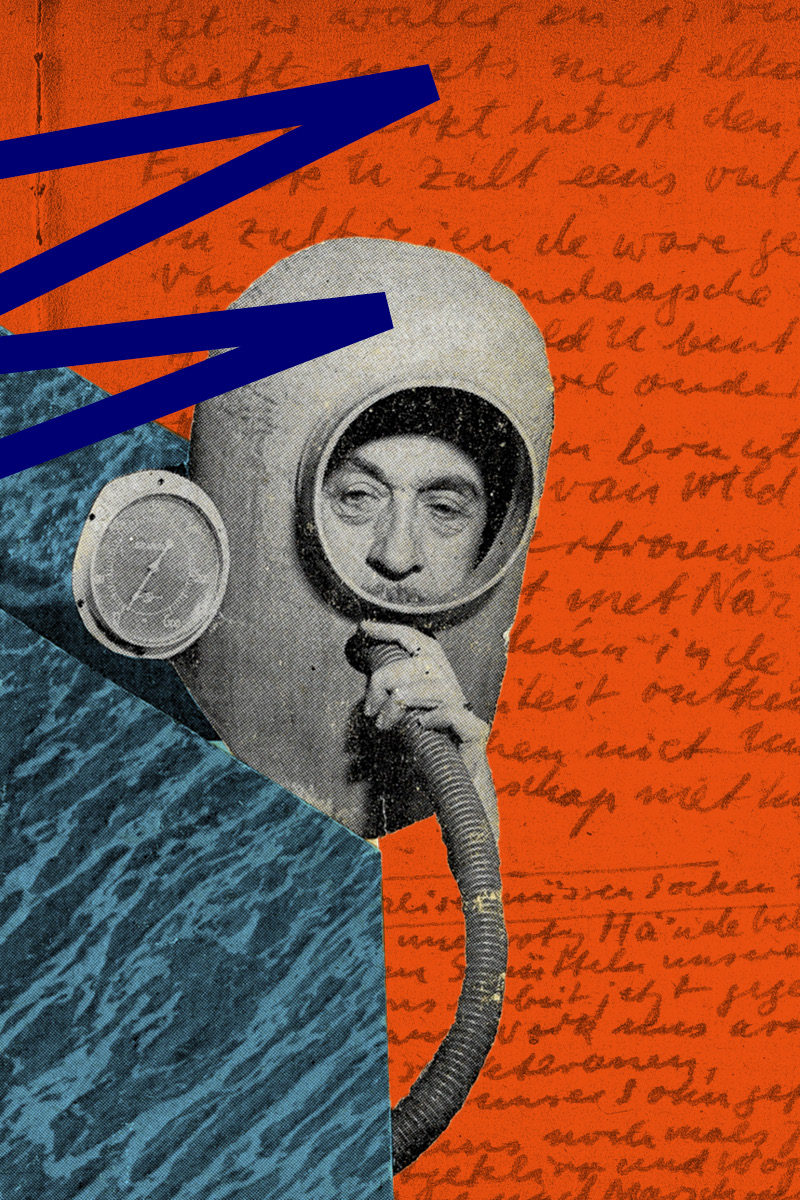
Exhibition “My Verses are Like Dynamite” Curt Bloch’s Het Onderwater Cabaret: Features & Programs
- Exhibition Webpage
- “My Verses are Like Dynamite” Curt Bloch’s Het Onderwater Cabaret: 9 Feb to 23 Jun 2024
- Accompanying Events
- Tour of the Exhibition “My Verses are Like Dynamite” Curt Bloch’s Het Onderwater Cabaret: Dates by arrangement (from 9 Feb to 26 May 2024)
- Exhibition Opening: 8 Feb 2024
- Curator Tour for FRIENDS OF THE JMB: 8 Apr 2024, in German
- Joodse Vluchtelingen: The Fate of German-Jewish Émigrés in the Netherlands: 3 Mar 2024, in German
- Archival Objects of German Jews in the Netherlands: Show & tell for FRIENDS OF THE JMB, 7 Mar 2024, in German
- Het Onderwater Cabaret Live. An evening of music and poetry: 11 Apr 2024, in German
- Publications
- JMB Journal 26: Het Onderwater Cabaret: Special edition on the occasion of the exhibition
- Digital Content
- Current page: OWC Online Feature: A Glimpse Behind the Scenes of the Exhibition
- Life and Work of Curt Bloch: Essay with biographical insights, JMB Journal 26
- Hidden in Enschede: Conversation with Contemporary Witness Herbert Zwartz: – Video recording, 16 April 2024, Jewish Museum Berlin, in German
- On the Piano of My Fantasy – Video with Marina Frenk, Richard Gonlag, and Mathias Schäfer, in German, Dutch and German Sign Language
- “It’s Complicated”: A text by Simone Bloch, daughter of Curt Bloch
- “Ik neurie mee ’t propellerlied…”: Essay on Het Onderwater-Cabaret: A Testament to Political Resistance in the Occupied Netherlands, 1943–45
- Clandestine Literature in the Netherlands 1940–1945: Essay, JMB Journal 26
- All Audio Pieces of the Exhibition with Transcriptions and Translations
- All issues of Het Onderwarter-Cabaret: All 95 issues to browse
- See also
- Survivors in Hiding (National Socialism)
- To the Web Project www.curt-bloch.com


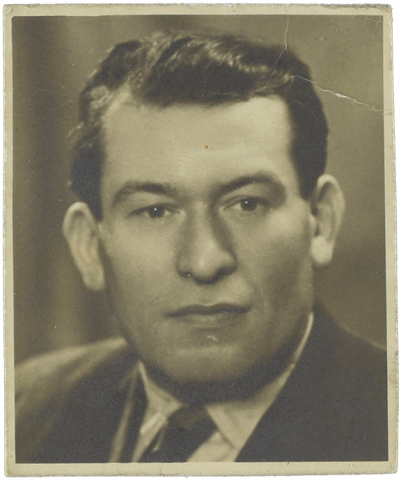
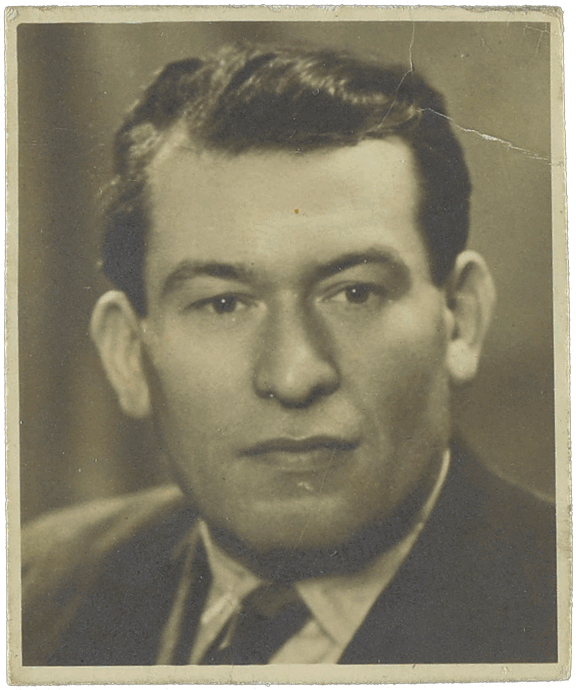 X
X
